







8 TURNING PASSION INTO PURPOSE 16 PREPARING COBBERS FOR A CHANGING WORLD 26 IT TAKES A VILLAGE










8 TURNING PASSION INTO PURPOSE 16 PREPARING COBBERS FOR A CHANGING WORLD 26 IT TAKES A VILLAGE

What a year it has been! As I reflect on Concordia College’s mission and impact, I am continually inspired by the ways our students, alumni, faculty, and staff make this place truly special.
At Concordia, we believe education is more than just acquiring knowledge — it is about discovering purpose and preparing for meaningful careers that make a difference in the world. We provide our students with a well-rounded education that facilitates critical thinking, inspires ethical leadership, and provides opportunities to engage real-world problems. Through rigorous coursework, hands-on experiences, and mentorship from dedicated faculty and alumni, our students are empowered to align their talents with their aspirations.
Through our commitment to educating, inspiring, and empowering students, we have forged a new path and made strategic investments in growth. In Fall 2024, we introduced more than 20 new programs designed to enhance the student experience by equipping them for high-demand careers while expanding cocurricular opportunities in music, art, athletics, and more.
The momentum is building! This fall, we welcomed our largest incoming class since 2018 — a 28% INCREASE from last year’s first-year enrollment, and we are currently trending ahead in our year-over-year recruitment efforts for Fall 2025. Our campus is alive with renewed energy, and we’re only just beginning.
Career preparation at Concordia is an intentional process. Our integrated approach ensures that students have access to internships, research opportunities, and global learning experiences that enrich their academic journeys. Our Career Center, faculty advisors, and extensive alumni network provide invaluable guidance, helping students translate their education into careers that fulfill their sense of purpose. Whether pursuing graduate studies, launching a business, or entering the workforce, our graduates are equipped to lead with confidence and conviction.
As alumni, you are a vital part of this mission. Your continued engagement, mentorship, and support help shape the experiences of current and future Cobbers. Together, we uphold the legacy of Concordia — transforming passion into purpose and preparing the next generation to influence the affairs of the world.
This is an exciting time at Concordia College, and the BEST IS YET TO COME.

President Colin Irvine
CONCORDIA MAGAZINE 2025 | VOLUME 62
Concordia Magazine is published once a year by Communications and Marketing, Concordia College, 901 8th St. S., Moorhead, MN 56562. To change your address or unsubscribe from the mailing list, contact Alumni Records at smithc@cord.edu or update your record online at ConcordiaCollege.edu/AlumniUpdate
© 2025 Concordia College, Moorhead, Minnesota 00148/35724/0225

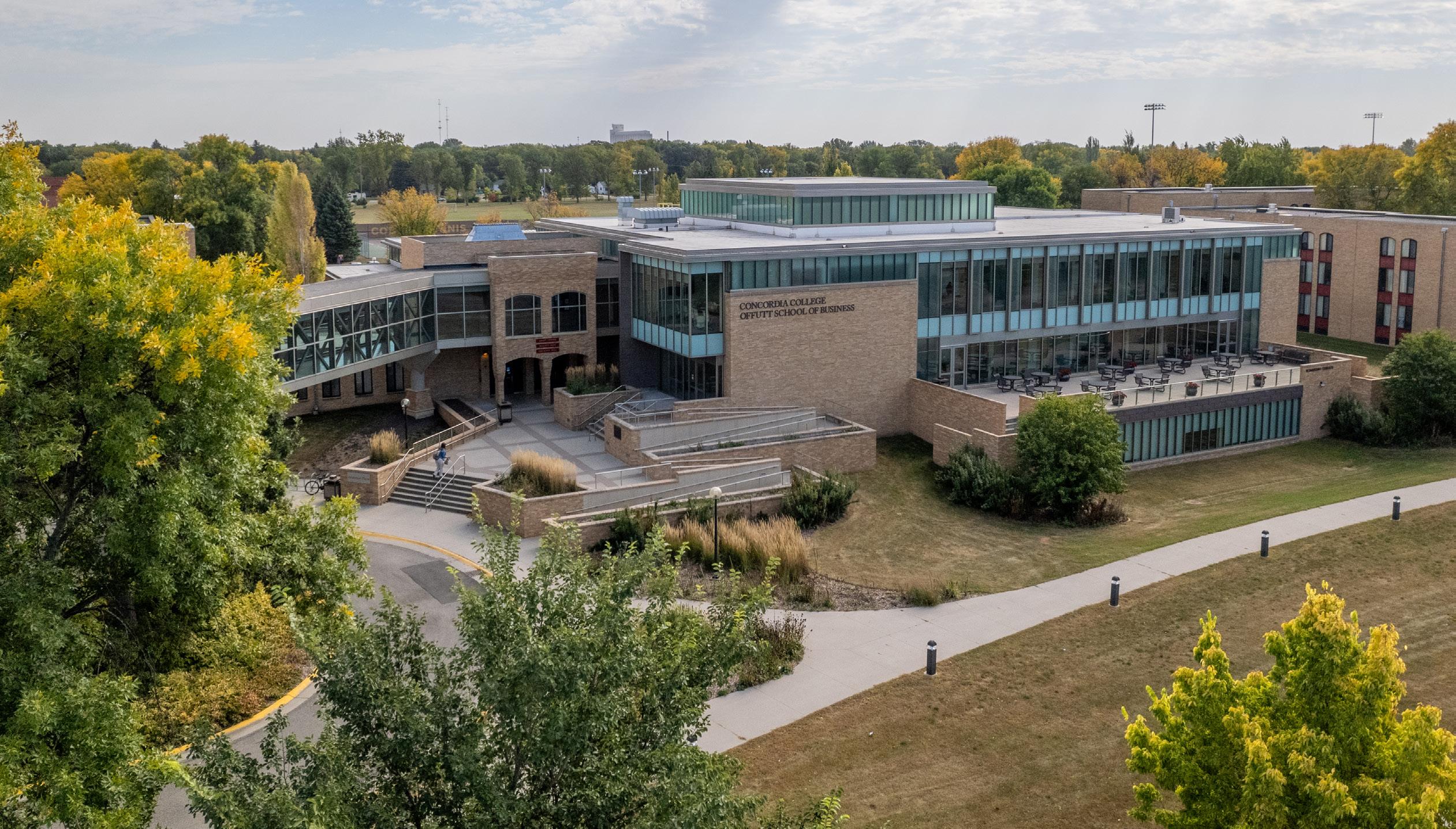
An anonymous donor has given a $20 million gift to Concordia’s Offutt School of Business.
As the largest gift given to the Offutt School of Business and one of the largest ever made to the college, this offering will significantly enrich the educational experience for students, expand academic programs, and solidify the school’s position as a leader in business education.
“This historic contribution will greatly enhance our capacity to nurture and equip the next generation of business leaders — individuals who will no doubt influence the affairs of the world with passion and purpose,” said President Colin Irvine
The impact of this gift will be far-reaching, building on the Offutt School of Business’ liberal arts foundation and career-centric learning for its mission to create global, ethical, and entrepreneurial leaders.
The funds will be used to upgrade teaching facilities with state-of-the-art technology, finance
initiatives that support students, sustain new programs spurred by a previous $10 million contribution that initiated the Invest to Grow campaign, and foster the development of courses to meet evolving workforce needs.
Additionally, the funds will help the college retain and build its world-class faculty as well as create a new position focused on instructional design and educational innovation.
As part of Concordia’s commitment to accessibility, a portion of this gift is dedicated to scholarships for Offutt School of Business students.
Dr. Susan Larson, provost and dean of the college, thanked the donor for their visionary support.
“You have bestowed upon us not just the resources needed for growth but also the confidence to dream bigger and the means to achieve those dreams,” she said.
The first class of nurses graduated from Concordia College’s 12-month accelerated nursing program in December 2023, and each one of them passed the national examination required to become a licensed registered nurse.
Despite the famously challenging nature of the test — its pass rate in 2023 was about 70% nationally — no one seemed surprised.
“The faculty that teach in the accelerated nursing program work really hard to ensure that we are preparing bachelor’s-prepared nurses ready for today’s challenging healthcare system,” said Dr. Joylyn (Sperle) Anderson ’99, program director of accelerated nursing.
The National Council Licensure Examination for Registered Nurses (NCLEX-RN) is a computeradaptive test, changing based on how someone answers questions.
Concordia’s accelerated Bachelor of Science in Nursing program provides a fast-track to the NCLEX and to that license for students who have already earned a baccalaureate degree with a nonnursing major.

Concordia College’s purpose is “to influence the affairs of the world” through its students, who glimpsed how those high-level diplomacy and political policy affairs work during an on-campus event.
“NATO at 75: Reflections, Relevance and Future Challenges” brought dignitaries from four nations together to talk about the importance of NATO to U.S. and world interests, its status as a safeguard against Russian aggression, and past and potential future expansion.
The panel included Anniken Huitfeldt, Norwegian ambassador to the U.S., Maria Markowska, first counselor and head of the political section at the Polish Embassy in Washington, D.C., Mark Newton,
minister defence (director USA) at the British Embassy in Washington. D.C., and Dr. John Deni, research professor at the U.S. Army War College’s Strategic Studies Institute. Dr. Rebecca Moore, NATO scholar and political science professor at Concordia College, served as moderator.
Discussion from the event was recorded as an episode of “Brussels Sprouts,” a podcast produced by the Center for a New American Security, an independent nonprofit developing and engaging with security and defense policies.
While much of the conversation focused on Russia’s invasion of Ukraine and the ongoing war there, Moore also asked participants to touch on the global implications of the conflict.

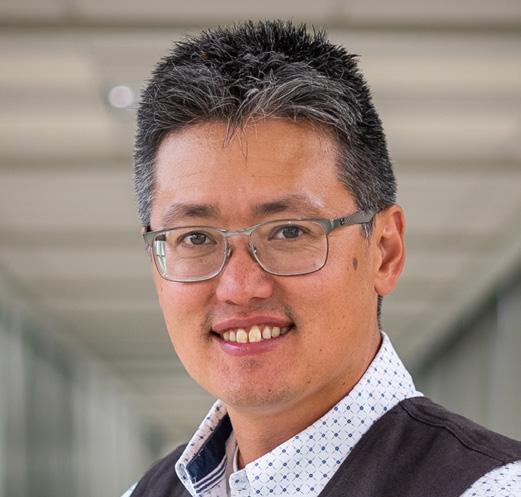

Concordia has named Rachel (Hanson) Clarke ’00 the new vice president for finance and administration following the retirement of Linda Brown ’73. Clarke most recently served as associate vice president for Advancement.
“Rachel’s dedication to our mission, combined with her extensive operations experience and strategic leadership, make her the perfect fit for this vital role,” said President Colin Irvine
Before joining Concordia, Clarke served as the associate executive director of YWCA Cass Clay and vice president of retail sales and marketing at Union State Bank. She holds a bachelor’s degree in business and English literature from Concordia and a Master of Business Administration degree and Master of Management degree from the University of Mary.

Dr. Lisa Twomey, associate professor of Spanish, has been named Concordia’s new director of community engagement and integrative learning.
“This role will allow me to support students, faculty, and staff as we link our campus to the local, national, and international community in meaningful partnerships,” she said. “Our mission and core guiding principle of engaged citizenship call us to strengthen our commitment to the community in creative and innovative ways, always keeping the best interests of partners and students at the center.”
As director, Twomey will be responsible for delivering community-based learning experiences for people across campus and helping students practice the skills necessary for engaged citizenship in an increasingly diverse student community.
Dr. Kelly LaFramboise has joined as the director for inclusion at Concordia. She will oversee the Inclusion, Diversity, Equity, and Opportunity Office, which opened in June 2024.
“I am thrilled to embark on this new role at Concordia College, a place where the principles of diversity, equity, inclusion, and belonging are creatively embodied as ‘radical hospitality,’” she said.
LaFramboise holds a master’s degree and a doctorate in cultural anthropology from the University of Oklahoma and two undergraduate degrees from Loyola University Chicago. Her prior experience includes work with the Oglala Sioux Tribe and at Valley City State University.
The IDEO Office is part of the newly established Office of Mission and Inclusion.
In February 2024, President Colin Irvine named Dr. Michael Chan vice president for mission and inclusion, noting Chan’s pivotal role leading the college’s diversity and inclusion efforts.
“Rooted in its Lutheran tradition, Concordia College is committed to cultivating a community that respects the dignity and complexity of all persons, encourages open-minded exploration of our world, appreciates the value of diverse and even disruptive ideas, and educates students who influence this world in profoundly impactful ways,” Chan said.
How can a community have too much water and not enough at the same time, and what can be done about it? Just ask Alecious Togbah ’25, who provided her community in Liberia with easy access to safe, clean water through Projects for Peace.
“We don’t have access to clean water, because the ocean is connected to the river, and then it pushes the tide into the community,” she explained.
The town, stretched out along the river, is frequently flooded by reddish-hued water that smells terrible because of the trees that grow in it. And while people can get around the floodwaters via narrow walkways, all that water is still unsafe to drink.
Until recently, people had to walk a long way, wait in line at a pump for potentially hours, and then carry gallons and gallons of safe water home for drinking, cooking, and daily use.
Now they have a better option, thanks to Togbah’s project — the installation of two water kiosks connected to the Liberia Water and Sewer Corp. and built within the Tweh Farm Community itself.
Funding for the $10,000 project came from Davis UWC Scholars Program through its Projects for Peace initiative.
“The project also inspired me to pursue my master’s degree in development studies, with a focus on sustainable solutions for communities like Tweh Farm,” she added. “This project has shown
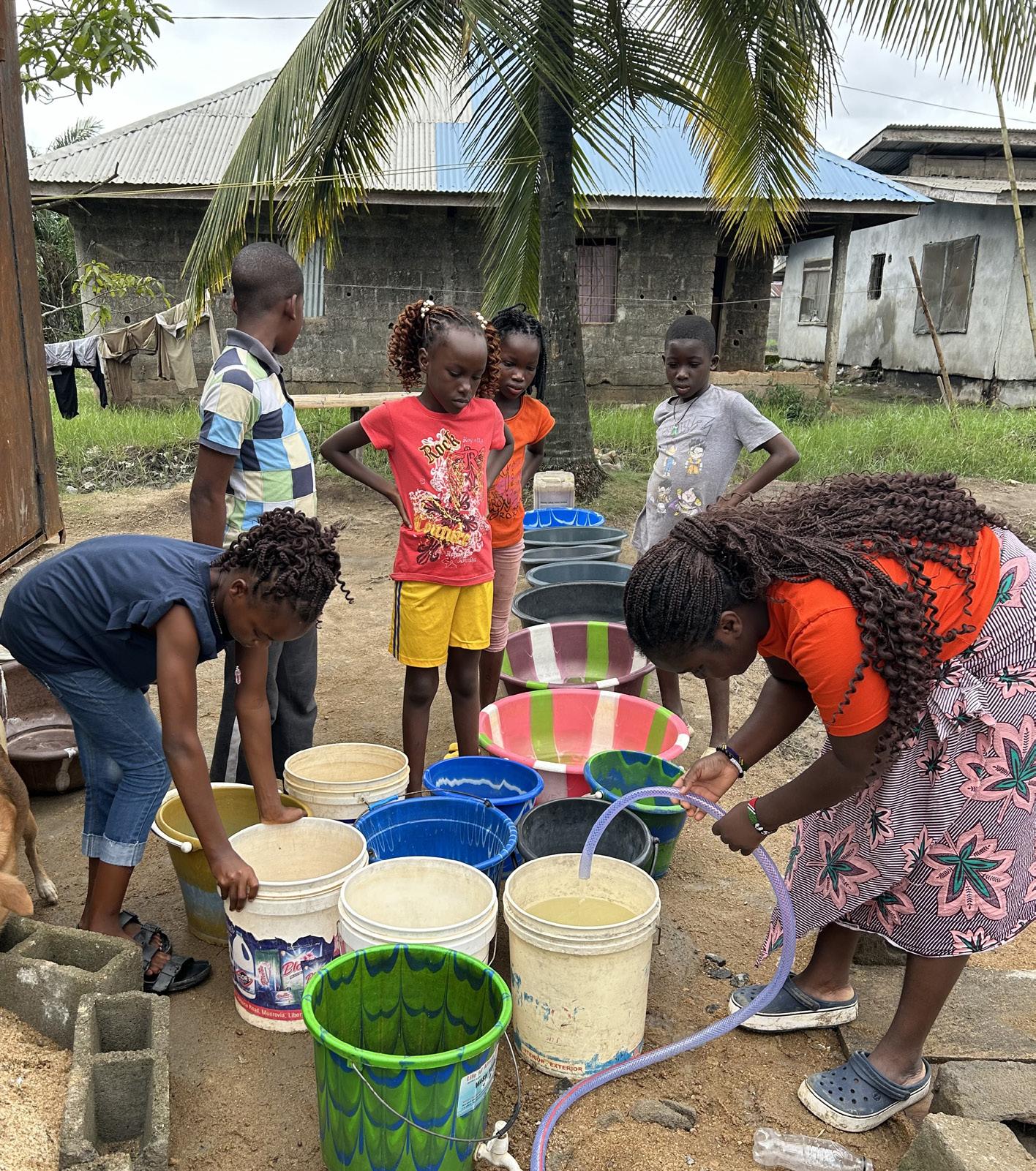
me the power of community collaboration and the transformative impact of access to basic needs like clean water. It has reaffirmed my belief that peace is built through collective action and sustainable solutions.”
Fargo native Capt. Brian Kesselring ’00 was prominently featured in the Amazon Prime documentary “The Blue Angels.”
The feature-length documentary, led by blockbuster director J.J. Abrams, was also screened at IMAX movie theaters. It follows the 2022 Blue Angels season, Kesselring’s last as commanding officer.
The U.S. Navy formed the Blue Angels team of top pilots in 1946 to raise interest in naval aviation through aerial performances of stunts.
“It was such a unique opportunity to serve our country in that capacity, and then to have it captured
along with our families was truly something special as the 2022 Blue Angels team has moved all across the world,” he said.
Kesselring performed at the 2021 Fargo AirSho.
“The teachers, coaches, mentors, and friends during my time at Concordia had a profound impact on my life,” he said. “In many ways, the initial vector of my early adult life was shaped by my time at Concordia.”
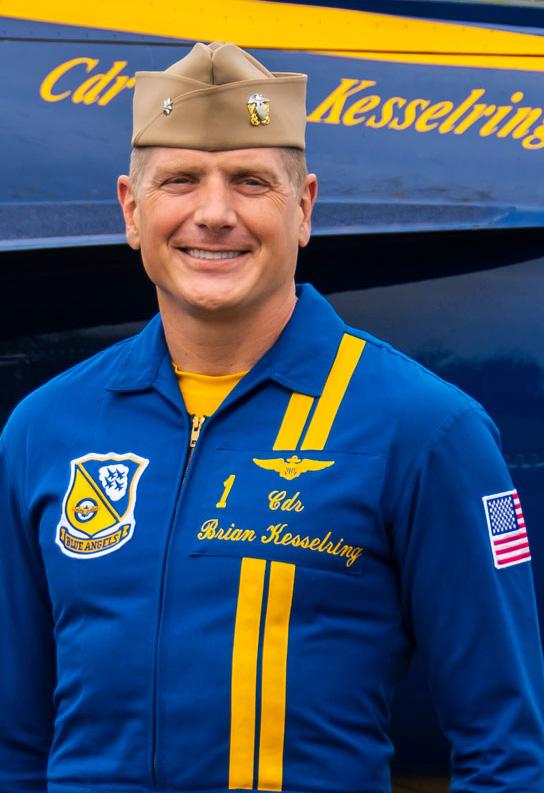
Five Concordia faculty and staff members were honored at the State of the College event last August.
The Flaat awards, conferred by Concordia’s Board of Regents, were endowed by Ole and Lucy Flaat, lifelong farmers in the Red River Valley. The Reuel and Alma Wije Professorship recognizes superior classroom teaching and significant service to the college and the church.
From left: Ben Schneweis, Katie Curry, Darin Ulness, Dan Biebighauser, Julie Rutherford, President Colin Irvine
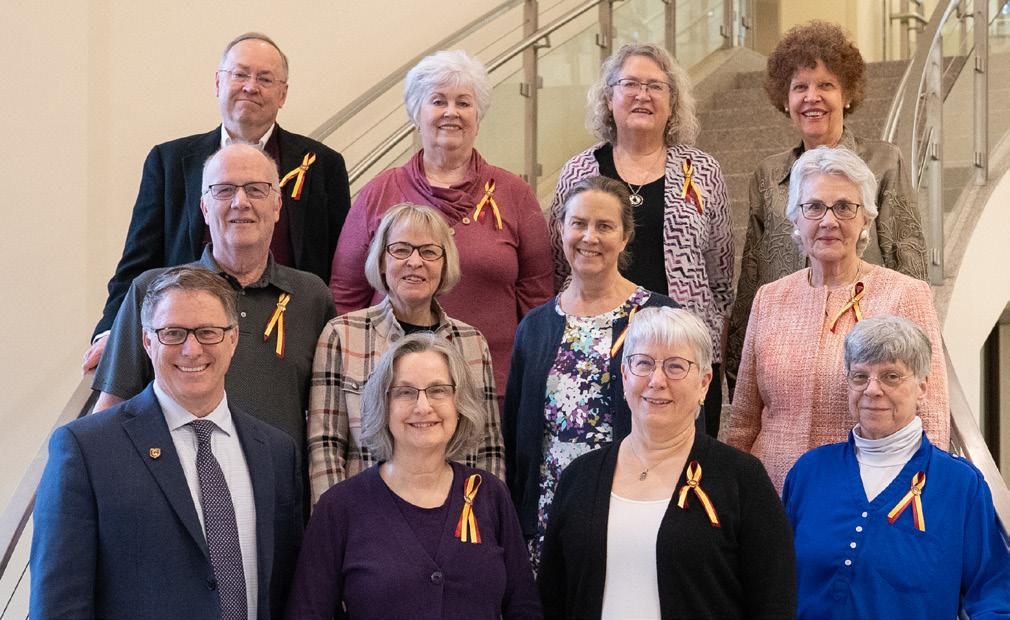
From front: President Colin Irvine, Pamela Miller, Laura Probst, Rebecca Anderson, John Phelps, Cindy LarsonCasselton, Ellen Aho, Linda Brown, George Connell, Kimberly Kappes, Carol Hedberg, Susan Ellingson

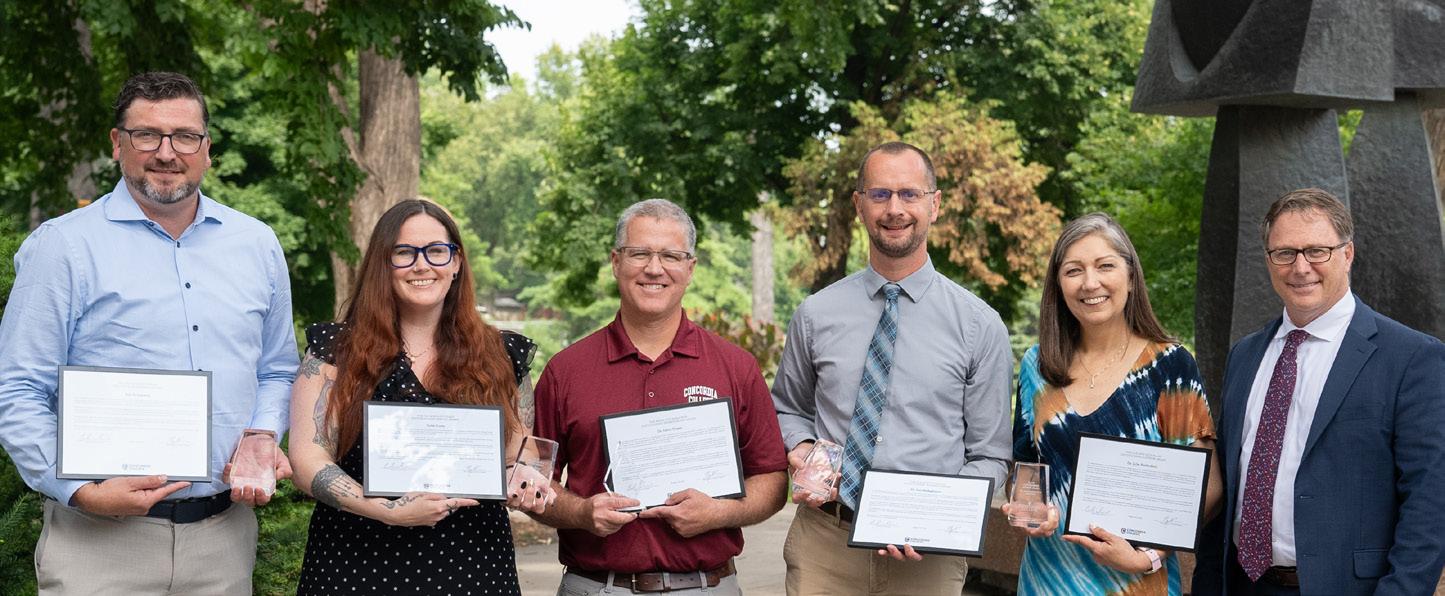
Reuel and Alma Wije Distinguished Professorship Award
Dr. Darin Ulness ’93, professor of chemistry
Ole and Lucy Flaat Distinguished Teaching Award
Dr. Dan Biebighauser ’02 , professor of mathematics
Ole and Lucy Flaat Inclusive Excellence Award
Ben Schneweis , associate athletic director and director of compliance
Ole and Lucy Flaat Distinguished Service Award
Katie Curry, costume designer/shop manager and adjunct instructor of theatre art
Ole and Lucy Flaat Distinguished Advisor Award
Dr. Julie Rutherford , associate professor of biology and director of the pre-health professions program
Nineteen members of the faculty and staff retired during the 2023-24 academic year. They have a combined total of 503 years of service to Concordia College and include: Christine Schulze ’78 , Concordia Language Villages, 41 years; Linda Brown ’73, Finance, 39 years; Dr. George Connell, Philosophy, 38 years; Dr. Susan Ellingson ’79, Education, and Dr. Cindy Larson-Casselton ’80, Communication Studies, 36 years; Kevin Morehead , Facilities Management, 35 years; Dr. Ellen Aho ’80, Biology, 34 years; Duane Melquist , Dining Services, 33 years; Scott Swedberg , Facilities Management, 28 years; Heather Vick , Concordia Language Villages, 26 years; Dr. Matthew Lindholm , Sociology, 23 years; Kimberly Kappes , Communications and Marketing, 22 years; Rebecca Anderson, Cobber Bookstore, Pamela Miller, Admission, and John Phelps , Print Shop, 20 years; Warren Schulze, Concordia Language Villages, 19 years; and Carol Hedberg , Offutt School of Business, Laura Probst , Library, and Corrine Rude, Concordia Language Villages, 11 years.
Six former student-athletes were inducted into the Concordia Athletics Hall of Fame this past fall. Former two-time MIAC Most Valuable Player Morgan (Bain) Hirsch ’07, three-sport athlete and track and field MIAC champion Micah Benson ’00, football All-Americans Nic Didier ’05 and Josh Dietz ’05, former two-sport athlete and longtime coach Doug Perry ’65, and AllAmerican volleyball standout Becca (Shane) Jorgenson ’07 were inducted.

In partnership with the Fargo-Moorhead Convention and Visitors Bureau and Oak Grove Lutheran School, Concordia Athletic Director Rachel (Burgau) Bergeson ’05 announced a $2.8 million outdoor facilities revitalization project to once again host Cobber track meets, provide future community athletic opportunities, and make Concordia the home for Grover track and field events.
Work to resurface the track and football playing surface inside Jake Christiansen Stadium is complete, including installing lights for the stadium
• Wrestler Gabe Zierden ’24 , Albany, Minnesota, was only the fifth athlete in the program to reach the NCAA National Championship match. He finished second in Division III at the NCAA National Meet in March. Zierden earned AllAmerican honors and finished his Cobber career with 105 wins.
• Last spring, the Cobber women’s basketball team earned a spot in the NCAA Tournament for the first time since 2014. Concordia, which advanced to the MIAC playoff championship game for the second straight year, was led by Makayla Anderson ’25, Bismarck, North Dakota,
on the south end of the Concordia College campus.
“This project is another step forward in providing quality facilities for our student-athletes,” she said. “We are also creating an environment that attracts students to our vibrant campus community.”
With a grant from FMCVB, Concordia has committed to hosting at least eight CVB-related events in the newly renovated facility.
The track surface was last replaced in 2000, and the field turf on the football field in 2010.
and Carlee Sieben ’25, Grafton, North Dakota, who earned D3hoops.com All-Region honors.
• Concordia had 41 student-athletes earn College Sports Communicators Academic All-District honors for the winter and spring seasons. The group was led by wrestler Elijah Hunt ’25, St. Peter, Minnesota, who earned CSC Academic All-American honors. Football student-athlete Collin Thompson ’24 , Thatcher, Arizona, also received the Academic All-American award.
• The Cobbers finished the 2023-24 athletic year with 150 student-athletes earning MIAC Academic All-Conference honors.
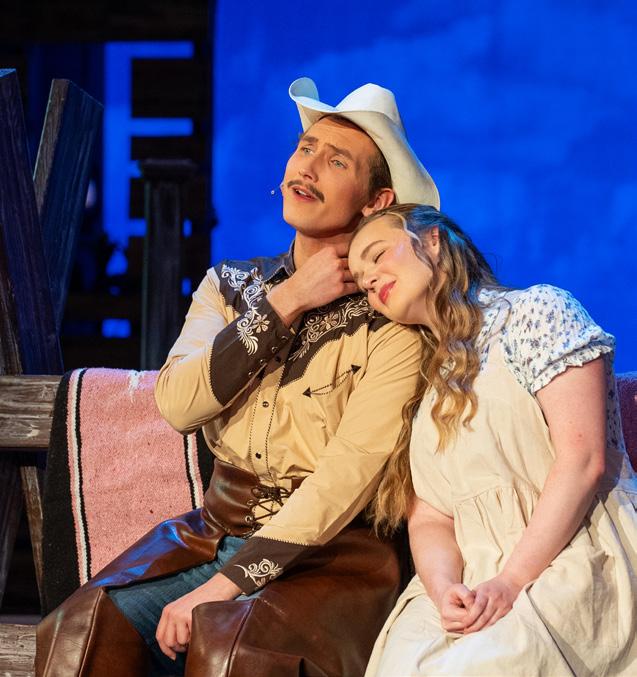



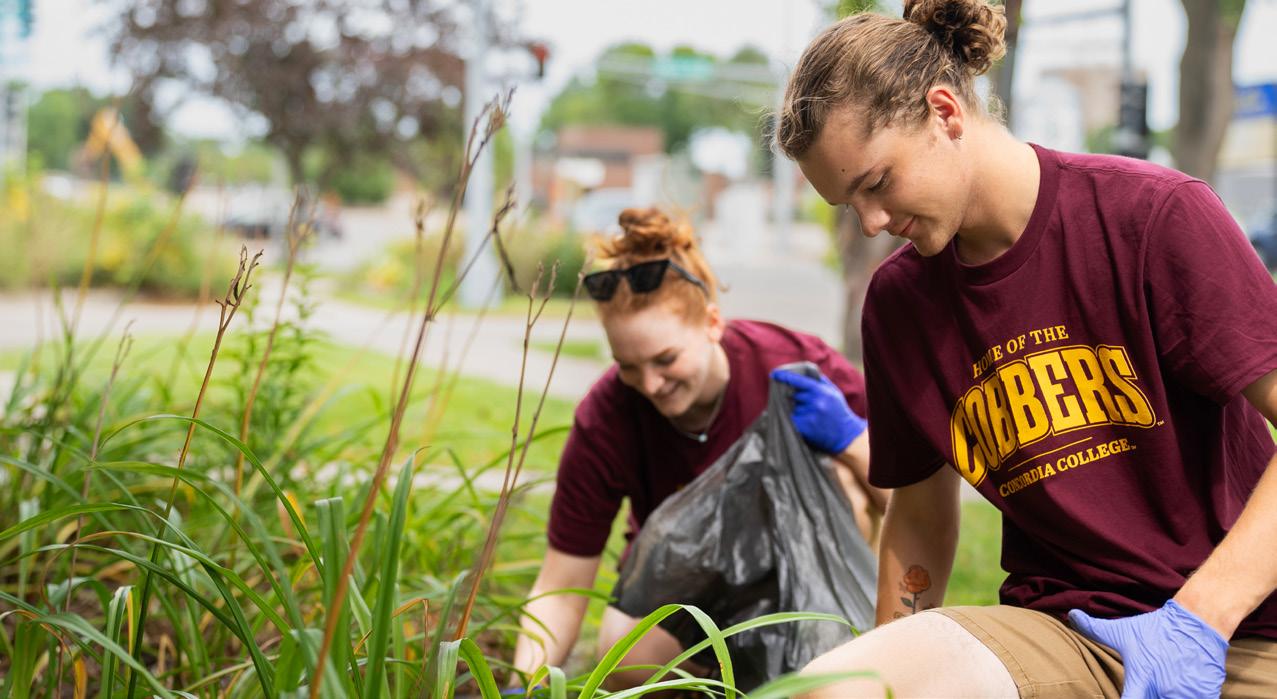
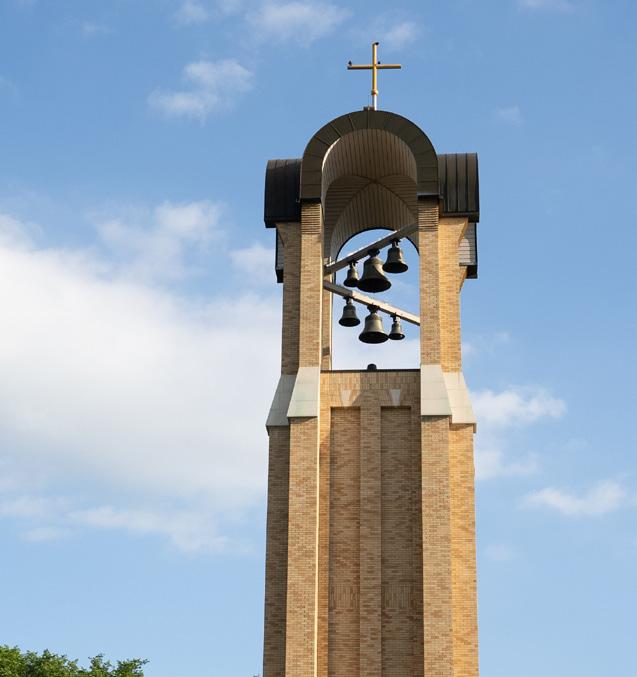
BY KELLY HEYER
Every student arrives at Concordia with unique interests, dreams, and aspirations. Families unload packed cars, roommates are meeting for the first time, and there is excitement and anticipation of new beginnings. For many, this day marks the official start of a journey filled with discovery, growth, and lasting connections. It’s the beginning of a college career that will not only shape their future but also their sense of purpose.
The journey from passion to purpose is central to the Concordia experience.
We don’t just ask students what they want to study; we ask them what they want to do, who they want to be, and how they want to impact the world. But the journey doesn’t end with a diploma — the connection to Concordia and its mission to influence the world continues throughout one’s life. Whether navigating a career, pursuing personal growth, or seeking ways to give back, turning passion into purpose is a lifelong endeavor.




Even before arriving on campus, Concordia felt like home to Sarah Fossen ’01. With her mom and uncle as alumni and her best friend, the late David Jergenson ’99, studying art education, the sense of familiarity and tradition made the transition seamless. Having completed high school a year early, Fossen sought a smaller campus with strong leadership opportunities, study abroad programs, and professors who truly cared about their students. At Concordia, she not only found all of that but also a community that exceeded her expectations in every way.
Fossen often jokes that her dad once told her she couldn’t make a living by talking on the phone and convincing people to go to parties, so she spent subsequent years proving him wrong. This led her down the path of finding her passion and turning it into purpose early on. Majoring in both communication studies and art, Fossen built a strong foundation in leadership, advocacy, and the arts — interests that have shaped her career and passions ever since.
“For me, it’s about taking what excites and inspires you — whether it’s art, politics, community-building, or advocacy — and channeling it into work that makes a difference,” Fossen explains. “Art and politics have always been integral to my life.”
Growing up discussing politics at the dinner table, Fossen developed a deep sense of civic engagement from an early age. At the same time, her passion for the arts was being shaped by her mom’s work as an art teacher and enriched through her travels, where she experienced the great art of the world firsthand. “Art and politics both shape our lives in ways we don’t often recognize, and I’ve always felt compelled to be engaged in both,” Fossen reflects.
These combined experiences prepared Fossen well for her current position as executive director of Minnesota Citizens for the Arts. In this role,
Fossen advocates for nearly $100 million in state arts funding each biennium. “Minnesota has some of the top funding for arts in the country, and our organization has a long, successful history of protecting and expanding those resources,” Fossen said. “To be a part of that legacy is truly an honor.”
The relationships Fossen built at Concordia have been instrumental in her personal and professional life. Her friend AJ Kiefer ’01 remains one of Fossen’s closest confidants, despite living in New York and Fossen in Minnesota. Similarly, her professional network has been enriched by fellow Concordia graduates like lobbyist Tom Hanson ’85, whose shared background fosters an immediate sense of trust and collaboration.
Beyond friendships, mentorship played a crucial role in Fossen’s career development. Her involvement in student government provided hands-on leadership experience and running the Concordia Art Club alongside Heidi Goldberg, professor emeritus of art, deepened her engagement with the arts. Working at The Rourke Art Museum under the mentorship of the late James O’Rourke ’56 gave Fossen invaluable insights into arts administration — grant writing, curation, and advocacy — that continue to inform her work today. “James is dearly missed, but his impact on my career and on the arts community as a whole was profound,” she said.
The friendships, mentorships, and experiences Fossen had at Concordia continue to shape her journey, proving that when passion meets purpose the possibilities are endless. Whether in advocacy, leadership, or the arts, finding meaningful work rooted in passion is the key to making a lasting difference.
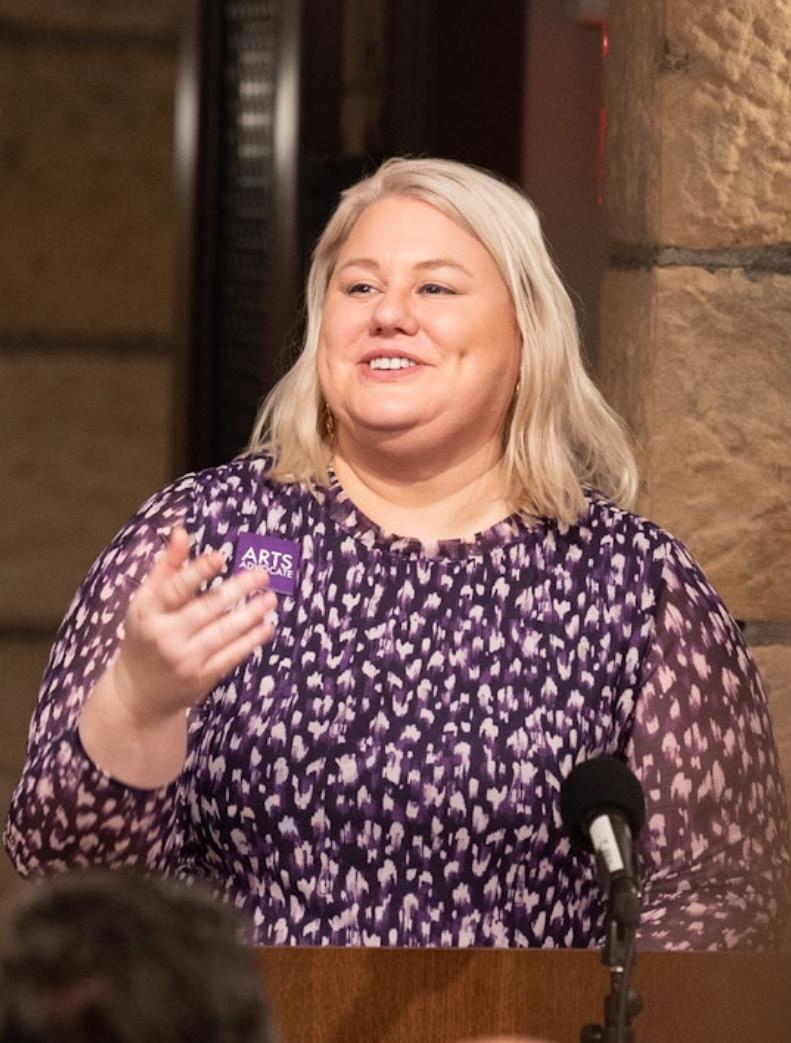
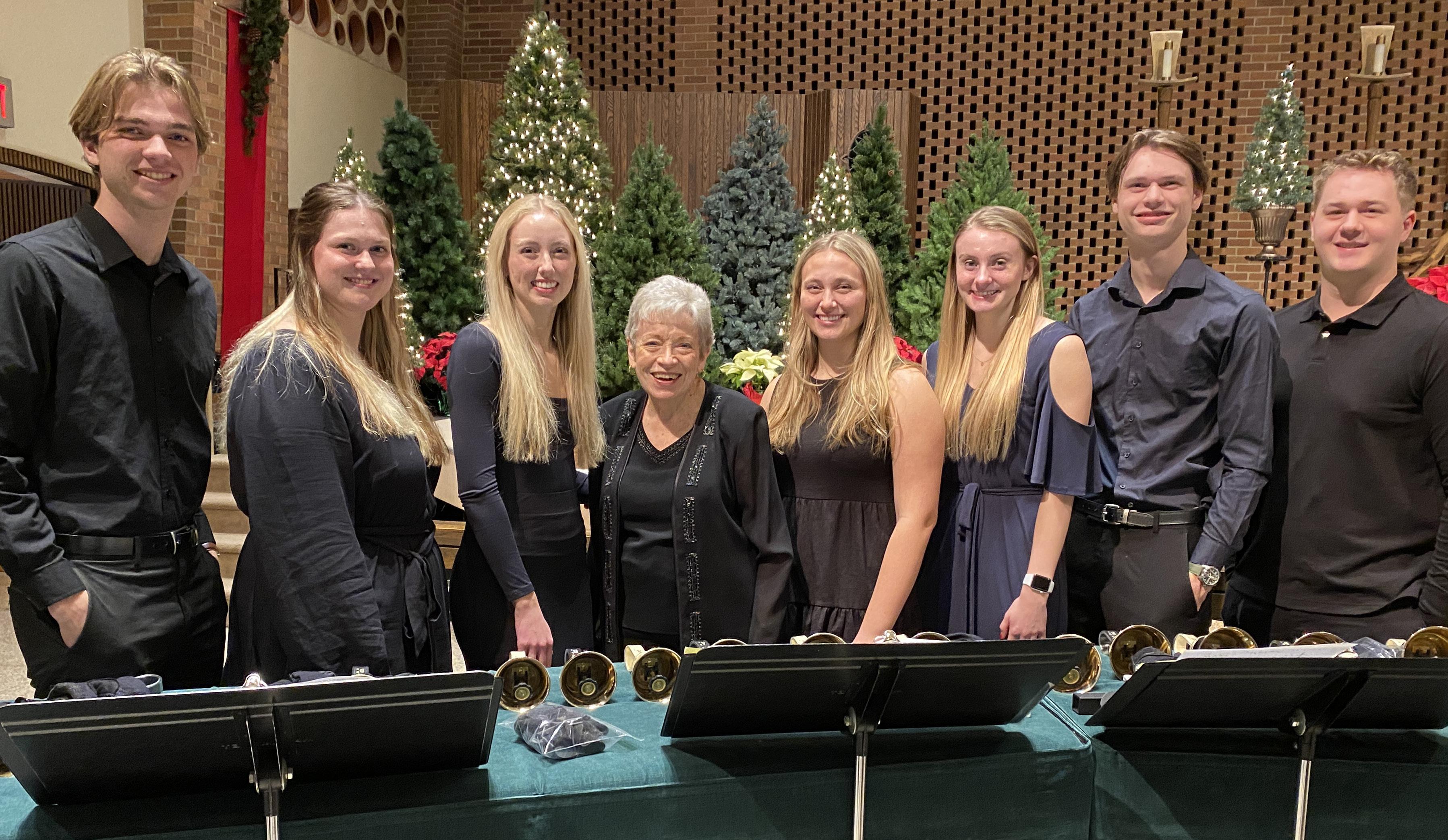

For Marlys (Alswager) Herring ’91, a lifelong passion for music began in childhood. From an early age, music played a central role in her life, making it a natural choice when she decided on a field of study. Although Herring began her college career in the 1960s, she paused her education to focus on raising her family. Even while busy with her children, Herring remained connected to music by teaching piano lessons, playing the organ, and directing her local church choir. Determined to fulfill her dream of earning a college degree, she returned to school and graduated from Concordia with a Bachelor of Arts degree in music in 1991.
In 1995, Herring joined the staff at Olivet Lutheran Church in Fargo, North Dakota. Over the past 30 years, her role has evolved significantly — from starting as the bell choir director to serving as choir director, organist, and now the director of music.
Herring has not only pursued her passion for music but also shared it with countless Concordia students over the years. By collaborating with local music teachers and professors, she has connected with students and helped them explore the life of a church musician. “The Concordia students have always
been excellent musicians,” she said. “I never hesitate to book them for as many gigs as I can. Olivet has truly benefited from their incredible gifts.”
For the past seven years, Herring has also recruited a Concordia student to serve as the accompanist for the church’s choir. For the past two years, that student has been Will Jacobson ’25
While in high school, Jacobson received valuable advice from his uncle that set him on the path to pursuing a Bachelor of Music degree in vocal music education. “My uncle told me that if I wanted a fulfilling career, I should take something I already love and find a way to turn it into a living,” Jacobson recalled. Inspired by this wisdom, he recognized that his passion for music could open doors to numerous career opportunities in a field he truly loved.
Jacobson first met Herring when she offered him the role of choir accompanist for the Olivet Choir. Before long, he became a familiar presence at the church, expanding his musical contributions beyond accompaniment. Over the past two years, he has sung solos, played piano with the contemporary worship band, performed solo organ pieces, taught lessons, and participated in numerous musical events. Throughout his
journey, Herring has played a pivotal role in providing him with these opportunities.
“Marlys has given me so many unique opportunities to make music,” Jacobson said. “Because of Marlys, I feel equipped to participate in numerous musical experiences and continue to explore new ones.”
Jacobson believes he is well prepared as he looks to further his education with a Master of Music degree in vocal arts. However, the influence Herring has had on Jacobson goes beyond music performance. “Marlys has taught me the importance of musical community. I can’t think of a better example than the Olivet Choir for what it looks like to live in community with the people you make music with,” he shares. “Marlys has the unique opportunity to turn her passion into purpose by helping others to do the same — and she does a top-notch job of it. It’s been an immense privilege to learn from her and the beautiful community she has fostered.”
As 19th century American poet Henry Wadsworth Longfellow once wrote, “Music is the universal language of mankind.” Herring embodies this sentiment by welcoming musicians from all backgrounds, helping them embrace and share their talents. “No matter what they do in life — whether it’s teaching physics in high school or managing a business — they can always pick up their horn or cello and share their musical gifts in a church on the weekend,” she said.
Elijah Heyer ’25, a physics major at Concordia, began playing his trumpet at Olivet after being invited by Herring. More than five years later, Heyer not only continues playing trumpet in church, but Herring has helped him expand his musical talents by recruiting him for the bell choir and encouraging him to play guitar in the contemporary worship band.
“Marlys has used her passion for music to bring together so many people through the musical performances she organizes and conducts,” Heyer said. “It’s so incredible to hear and see all the people that she unites into one choir or ensemble and takes their combined abilities and turns it into amazing music. The services and performances that she brings to life through her music expertise and passion are consistently impactful to those in attendance and the performers.”
Heyer says he feels fortunate that Herring gave him an opportunity to stay involved in music in ways that he never imagined. “The opportunities to stay involved with music seem to decline the further out you get from high school,” he said. “Fortunately for me, Marlys invited me into ensembles where I can continue exploring my passion for music.”
Herring’s deep passion for music undoubtedly led her toward a greater purpose — enriching her community and inspiring countless musicians. “I am fortunate to share my passion for music with fellow musicians and together make meaningful musical moments in the worship life of my church community,” she said.
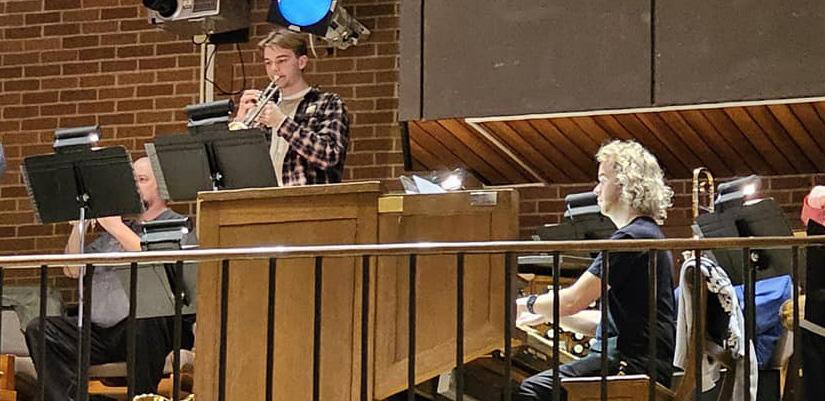

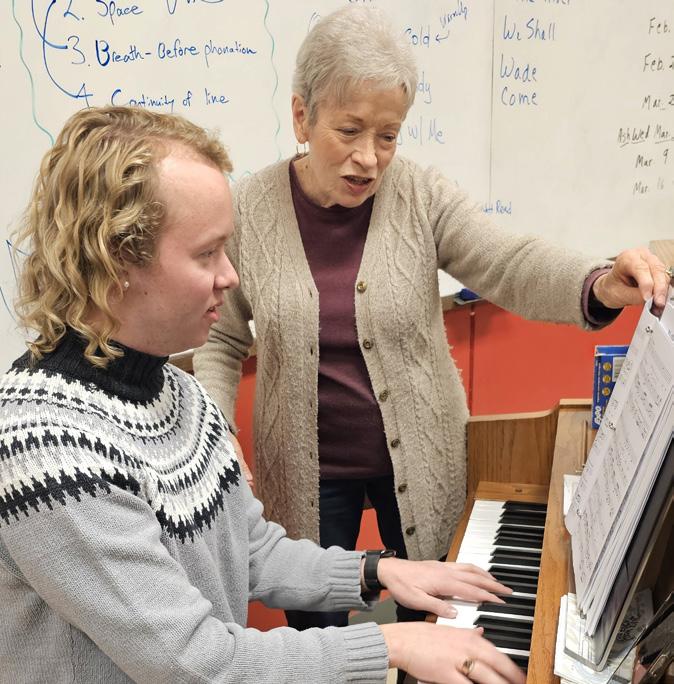
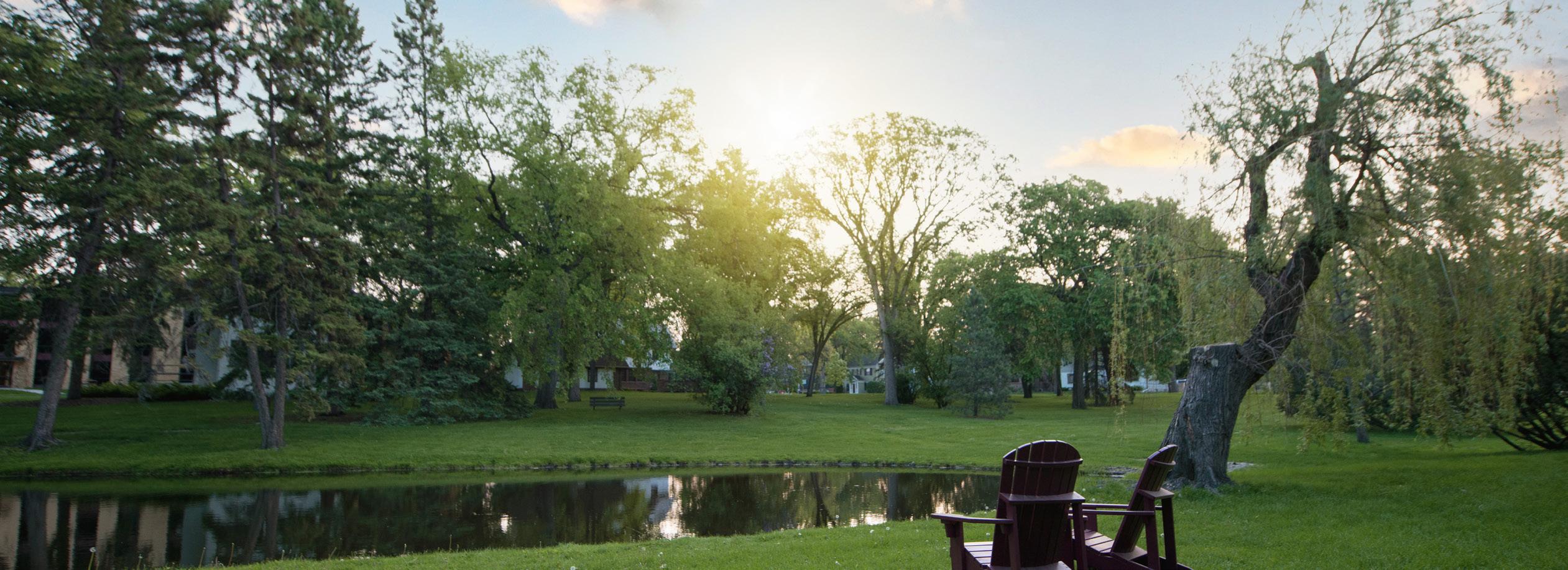
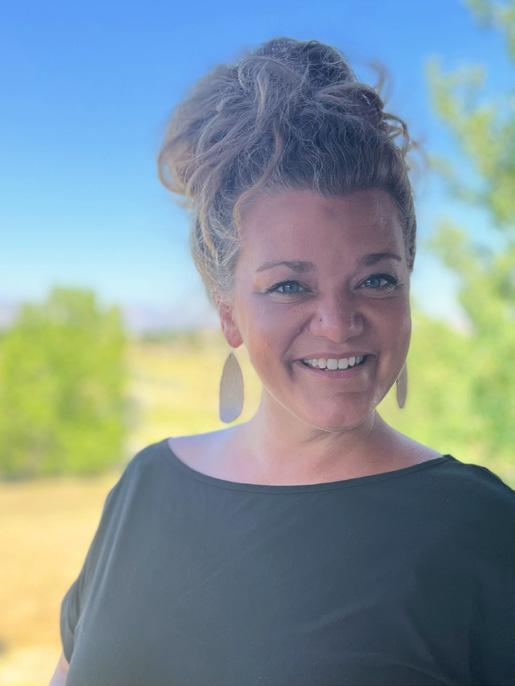
After 15 years as a special education teacher, Katie Michaelson ’01 was searching for a holistic approach to managing the stress she experienced in her career. Her research led her to Emotional Freedom Technique (EFT), also known as tapping — a psychological acupressure method designed to send calming signals to the brain, reducing emotional intensity and distress. This discovery ignited a new passion for supporting children’s mental health in a transformative way.
As Michaelson experienced firsthand the profound impact EFT had on her own well-being, she became determined to share this tool with others. In 2022, she earned certification in Clinical Emotional Freedom Technique, followed by a certification in Advanced Energy Psychology in 2024. These achievements paved the way for her to launch EFT with Katie, a business dedicated to helping others build emotional resilience.
Michaelson credits her elementary education major from Concordia and her master’s degree in special education for deepening her understanding of child development and shaping her passion for teaching and supporting children. “My background enables me to truly connect with and build trusting relationships with children, helping them engage,” she explains. “This connection allows them to learn the selfhelp tool of tapping while also empowering them to better understand and navigate their emotions.”
Staying closely connected to her roots in education, Michaelson now offers workshops
and training for teachers, equipping them with strategies to support their students’ emotional well-being.
Michaelson’s passion for global engagement was shaped by her experiences at Concordia, where she completed her student teaching in New Zealand and later traveled to Spain on an alumni trip. “These experiences broadened my perspective and deepened my understanding of our global interconnectedness,” she shares. This worldview has since fueled her work with an organization supporting teachers and students in Ukraine, helping them navigate trauma related to conflict. She also volunteers with Veterans Stress Solution, offering support to military members and their families.
For Michaelson, her journey has been one of growth in self-love, acceptance, and compassion. “My passion for finding a holistic approach to emotional freedom evolved into a greater purpose when I saw how sharing this tool positively impacted others,” she reflects. She also emphasizes that passions and purposes are ever-evolving.
“When you pursue your passion and purpose, you can live in faith and confidence knowing you will make a positive impact in the lives of others as well,” she said.

For JoonHyung Cho ’04, research has never been just about discovery — it’s about making an impact. As assistant vice president in the Research and Innovation Office at the University of Minnesota, he ensures that groundbreaking innovations don’t stay confined to the lab but reach industries, communities, and people who need them most. Whether securing funding, building partnerships, or communicating the realworld impact of research, Cho’s work is all about turning big ideas into tangible solutions.
Cho credits his chemistry background for preparing him to analyze problems and think creatively and thanks his liberal arts education for helping him connect the dots between faith, science, society, and leadership.
“In a way, it ties back to Concordia’s mission — helping shape the world by ensuring knowledge and discovery serve a greater good,” Cho reflects. “That sense of purpose, of using what we know to serve others, has been a guiding force in my career.”
A pivotal moment during his time at LSU AgCenter showed Cho how research could directly support industries like agriculture and solve real-world challenges. That moment helped Cho realize he wanted to help bridge the gap between universities and the outside world. But it was his experiences at Concordia that first set him on that path.
“More than anything, Concordia emphasized purpose — learning wasn’t just about getting a degree; it was about how we use that knowledge to serve others and make an impact,” Cho said. “That mindset has stayed with me throughout my career.”
Cho’s college experience also taught him the importance of teamwork — working alongside people from diverse backgrounds, with different communication styles and perspectives. In his role as a researcher and innovator, where collaboration is essential, this skill has proven invaluable. “Whether I’m working with industry leaders, government agencies, or fellow researchers, the ability to navigate different viewpoints and find common ground is something I developed at Concordia,” Cho said.


When reflecting on his greatest influences, Cho immediately points to his professors — many of whom are still teaching, constantly innovating to engage students and redefine the boundaries of education. “What has always stood out to me is their humility,” he shares. “No matter how much they evolved, they never lost sight of their role as teachers — the same teachers who welcomed me when I arrived in Moorhead with limited English from Seoul, Korea, who believed in me, and who helped me build the confidence to grow.”
But beyond career success, Concordia gave Cho something even more lasting — community. It’s where he formed lifelong friendships and, most importantly, met his wife, Desiree (Lindbom) ’03. “No matter where my career has taken me, Concordia has always been home,” he said.
For Cho, passion and purpose are inseparable. His career is a testament to the idea that research isn’t just about knowledge — it’s about using that knowledge to change lives.

Moorhead High School’s 2024 production of “Big Fish,” featuring Lance Morlock’s costume designs

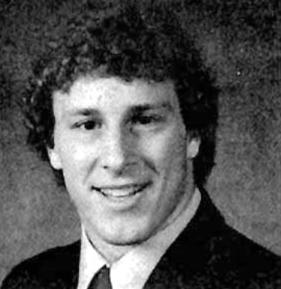
BY PENNY BURNS
For Lance Morlock ’22, the stage has always been more than just a place for performance — it’s a space for connection, storytelling, and healing. That belief has guided him on a journey from actor to costume designer, turning his passion for theatre into a meaningful purpose.
That purpose became deeply personal when Morlock had the opportunity to design costumes for Moorhead High School’s production of “Big Fish” — a musical that has held profound significance in his life.
In 2016, while Morlock was in high school, his father, Paul Morlock ’86, a former Concordia wrestler, passed away from colon cancer. Just weeks later, Lance Morlock attended Concordia’s production of “Big Fish,” a story about the relationship between a son and his father facing a terminal illness.
Years later, Morlock transferred to Concordia College as a sophomore, majoring in communication studies. Though the transition was daunting, he quickly found his place with the guidance of Dr. Cindy Larson-Casselton ’80, his advisor, who encouraged him to pursue theatre, music, and campus events. Soon, he was singing in choir, auditioning for musicals, and actively engaging in the campus community.
It was Concordia’s theatre program that ultimately helped Morlock discover his passion for costume design. He performed in productions like “Young Frankenstein,” “Songs for a New World,” and “Into the Woods,” each experience sharpening his creative skills. His role as the Witch in “Into the Woods” was a turning point — he worked closely with Concordia’s costume designer, Katie Curry, and became fascinated by the process of bringing characters to life through costume design.
“I loved every step of the process — from seeing Curry’s designs to fittings and watching the pieces come to life on stage. Costumes play an incredibly large role in storytelling,” he said. “While I love performing, there’s something

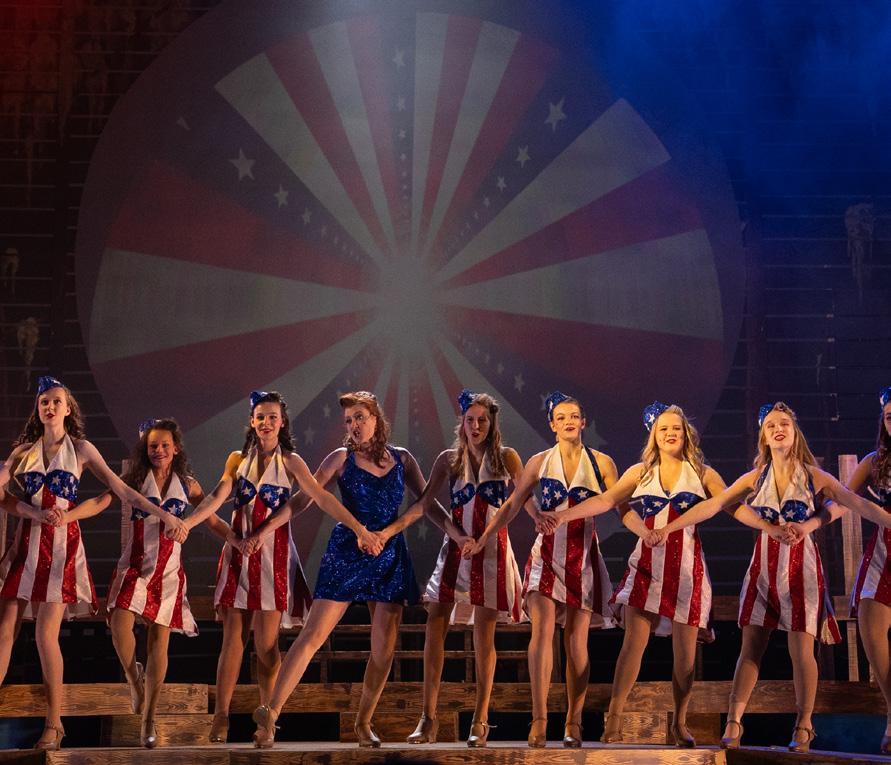
magical about being behind the scenes and helping create that world.”
Designing costumes for “Big Fish” was a fullcircle moment — an opportunity to honor his father’s legacy while embracing the passion that had shaped his own journey. Every seam, stitch, and silhouette became a tribute, not just to his craft but to the memories and lessons that defined his path.
“One part of my dad’s life that he loved and spoke fondly of was his time at Concordia,” he said. “Although he wasn’t here to see the day I graduated, I know he would have loved that I found my way home to Concordia.”
Through theatre, Morlock found more than just a creative outlet. He found a way to heal, connect, and make an impact, using his artistry to help tell meaningful stories. In turning his passion into purpose, he ensures that every design he creates carries the same heart, depth, and storytelling power that first inspired him.

The excitement and anticipation of new possibilities when stepping onto campus for the first time never truly fade — especially when you discover your passion and transform it into a greater purpose.
For over 130 years, Concordia alumni have been shaping the world in meaningful ways, guided by the values, relationships, and experiences they cultivated at Concordia.
Here, the question isn’t just, “What will you do?” but rather, “How will you use your gifts to make a difference?”
The stories of Sarah Fossen, Marlys Herring, Katie Michaelson, JoonHyung Cho, Lance Morlock, and many others embody this spirit — proving that when passion meets purpose, the possibilities are endless.
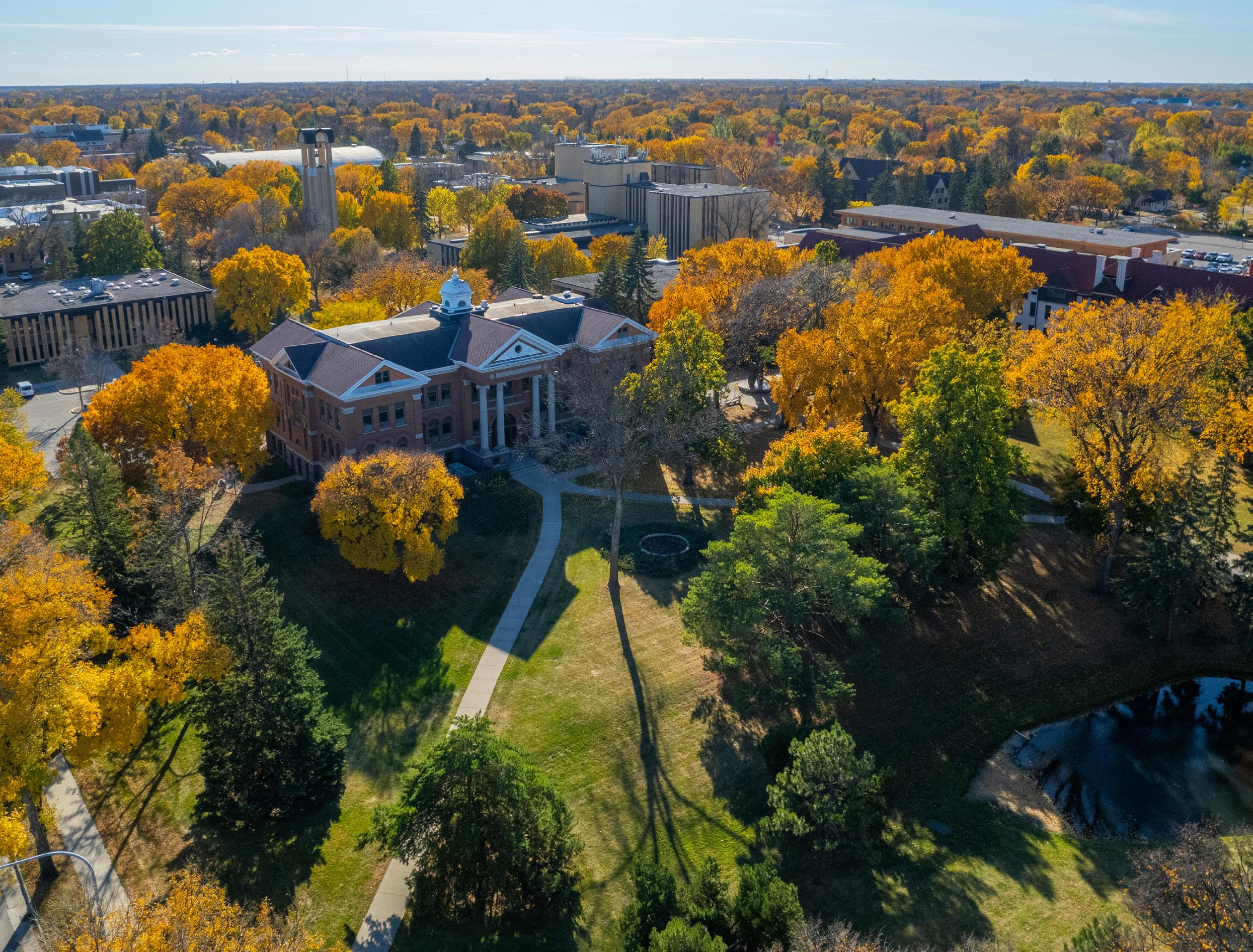
BY KELLY HEYER AND KARI LUCIN
As workforce demands shift, student expectations evolve, and technology advances, Concordia seamlessly integrates career preparation with a liberal arts education. Through experiential learning, internships, alumni mentorship, and cuttingedge technology, we ensure our graduates are not only competitive but also adaptable, prepared to excel in a dynamic job market.
In Fall 2024, Concordia established an AI Council, an initiative dedicated to advancing the college’s integration of Artificial Intelligence across teaching and learning, college operations, and community engagement. The AI Council will explore ways that AI aligns with our mission and values, supporting critical discussions around AI’s impact on society.
The chair of the AI Council is Dr. Darin Ulness ’93, professor of chemistry and neuroscience. Ulness has provided grassroots leadership of Concordia’s response to generative AI and coordinates the AI Critical Questions working group.
The coordinator of AI initiatives is Joe Kennedy, instructional designer and academic technologist with the college’s Information Technology Services. Kennedy brings an expertise in AI’s intersection with student safety,
privacy, and pedagogical frameworks. Kennedy has represented Concordia at a number of speaking engagements regarding the impact of AI in higher education.
In addition to the AI Council, faculty and staff have been participating in workshops and seminars focusing on AI in the classroom, learning the essentials of how the technology works, what it is capable of, and what it does poorly.
They also discussed how to teach students to use AI well, to improve their work, and increase their capabilities in a responsible way. The tool can be used to aid critical thinking and information literacy rather than shutting it down.
The AI Council’s work will advance AI’s role at Concordia and enhance our educational impact and community engagement.
Alumni mentorship plays a crucial role in preparing Concordia students for their careers. The college has a strong network of alumni who actively engage with current students through mentorship programs, career panels, and networking events. These alumni provide valuable industry insights, professional guidance, and connections that help students navigate their career paths with confidence.
The Offutt School of Business Mentorship program pairs students with alumni business professionals in their chosen area of study. In collaboration with Alumni Relations, students are paired with the mentor that is the best match for them. Students and mentors meet once a month to discuss a variety of topics ranging from information about the job sector to learning about upcoming internship opportunities; from seeking advice from veteran workers to setting short-term and long-term goals. OSB Mentorship provides a real-world application of a student’s education and connects it to their future employment and leadership opportunities.
The newest opportunity for Concordia College alumni to share their knowledge, experience, and wisdom with current students has arrived in the form of the mentorship-focused Insight Exchange program.
“It’s been in development with our new platform for over a year,” said Shar Berns ’00, associate director of alumni engagement at Concordia, noting that many alumni have said they wanted to do more for current students. “We have great people who want to help.”
Insight Exchange allows them that opportunity.
Prospective mentors and mentees simply fill out a profile, including their communication preferences, industry, specialty, demographic information, and career history or interests. Students can choose up to three mentors who best match their own goals and request to connect with them through the college’s Cobbers Connect platform, sharing what they hope to achieve and their communication preferences.
Mentors who accept the request can communicate with their mentees via the secure platform, answering career-focused questions and offering opportunities in professional networking, job interview preparation, job shadowing, or insights on graduate school or entrepreneurship experiences — whichever services they have decided to offer.
All participants have complete control over their connection and involvement, as the platform is designed to maximize flexibility.
“It can be as little as one message or a phone call with a couple of questions up to some true long-term guidance,” Berns said. “Many of our alumni just love to talk to these students and get to know them. Sometimes there’s just that special connection, and they really get taken under someone’s wing.”
All Concordia students of sophomore or higher class standing are invited to sign up as mentees, and all Concordia alumni and current faculty and staff members are invited to become mentors.
The Career Center and Center for Student Success are partnering to help coordinate the process for mentees, with Insight Exchange likely rolling out more broadly for students this spring.
“For years, we’ve been hearing from alumni that they want to help,” Berns said. “Connecting students with seasoned professionals can be life-changing. Whether building a resume, preparing for an interview, or getting career advice — especially for those without that kind of experience in their personal network — to be able to ask someone those types of questions is highly valuable.”
Integrative learning is at the heart of the student experience, fostering connections between disciplines, real-world applications, and personal growth. Through hands-on opportunities such as internships, research projects, student-run organizations, community engagement, and study away programs, students gain practical insights that enhance their academic learning. New state-of-the-art labs and interactive spaces on campus ensure that career preparation begins on day one.
In a rapidly changing world, Concordia remains steadfast in its commitment to providing a transformational experience for every student. Rooted in our Lutheran faith tradition, we continuously innovate and strengthen our foundation in the liberal arts. By equipping our students with essential skills in communication, critical thinking, and problem-solving, we empower them to become the creative and visionary leaders our world needs today.
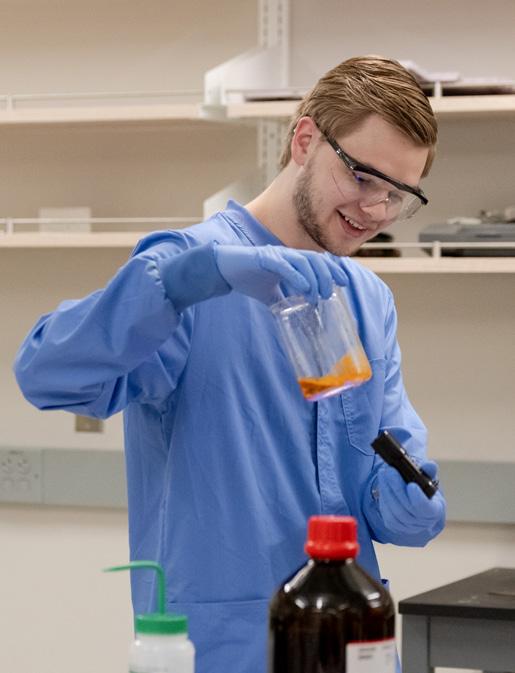
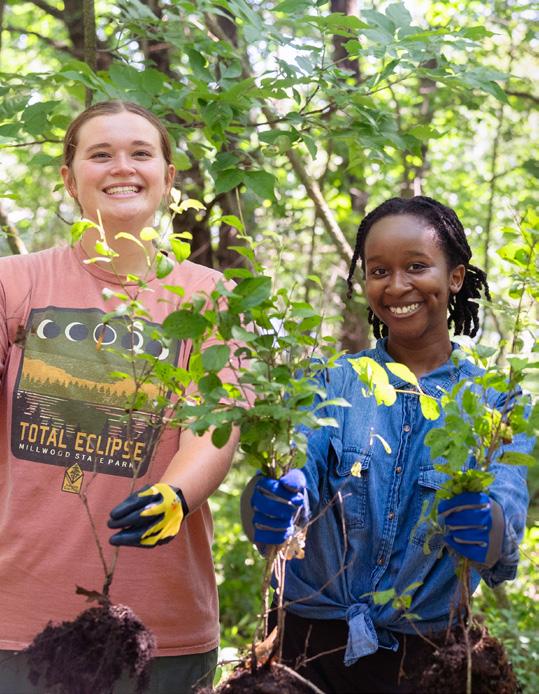
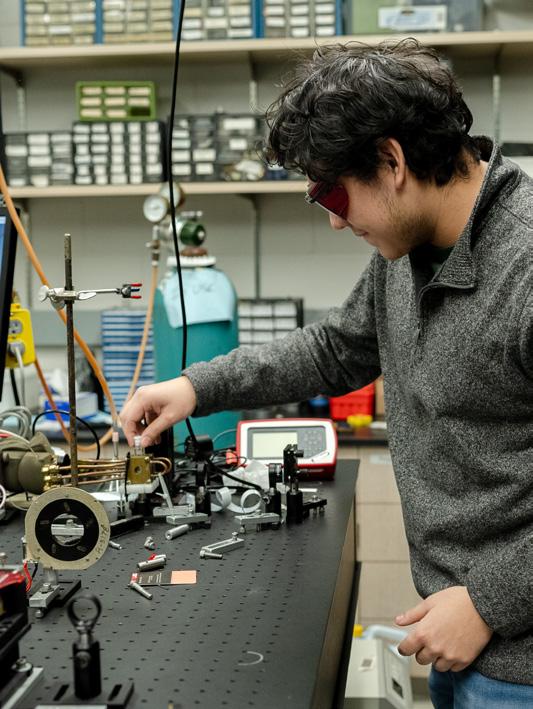

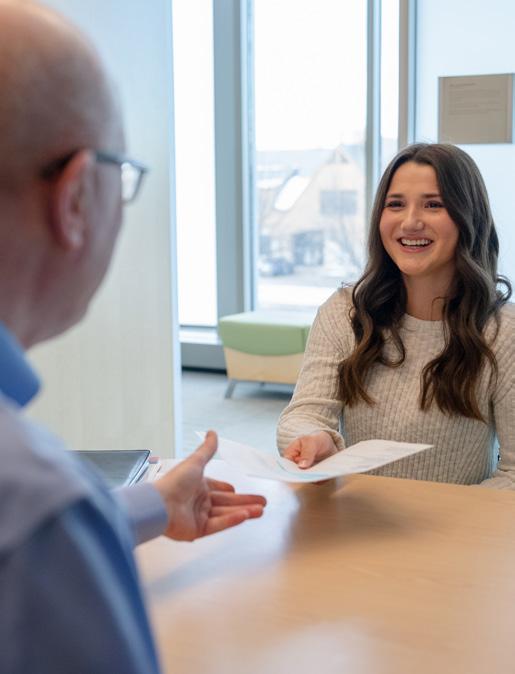

BY ALI FROSLIE ’18
On a mild day in September, Dr. Mike Bush’s limnology class is not in their usual classroom on campus. Instead, they are waist deep in the Buffalo River diving headfirst into real-world experiences that connect classroom concepts to hands-on work in the field.
Tucked behind Minnesota State University Moorhead’s research center at Buffalo River State Park, there’s a stretch of river that Bush uses frequently with his students (as a result of a great working relationship with MSUM). The area, nearly hidden by waving, golden prairie grass, becomes
a living laboratory, offering an opportunity to study everything from water quality to aquatic life.
On this day, Bush has his students working on exercises that will help them familiarize themselves with techniques used to assess river quality. The students have broken into three groups — the first group, closest to the access point, is measuring the depth of the water, how fast the water is flowing, and how big the sediment is. The other two groups are further down the river and studying the lifeforms in the water.
While they work, Bush quizzes the students on terms they’re learning as part of their coursework.
He calls out to one of his students, who stands on the shore to record the numbers her classmates gather: “What’s the deepest part of the river?”
The answer is “thalweg.”
Bush is an enthusiastic teacher. While his students are all in waders, Bush wears shorts and Keen shoes — but that doesn’t deter him from getting up to his waist in the river, right there alongside his students. He bounces between groups, often verbalizing his excitement over their discoveries, whether that be the depth of the river or the size of a fish.
“You guys are going to make the coolest graph,” he said.
Despite his enthusiasm now, he never planned on being a teacher. His wife got a job at Concordia, so Bush applied for an adjunct position out of a need for a job. That led him to where he is now — an assistant professor of biology on tenure track.
He jokes: “If you had shown me 10 years ago what I’m doing now, I’d say, ‘Oh no, what happened?’”
However, that doesn’t stop Bush from calling his work a dream job.
“That first year, I taught ecology and conservation biology and I absolutely fell in love with teaching. It’s just as much fun as you can possibly have,” he said. “I can spend my time talking to students about conservation issues, which I would argue are some of the biggest issues that humanity faces. I get to spend time having fun and having discussions and trying to turn this generation into the next generation of conservationists and scientists.”
Getting the students out in the field is more than just a fun way to spend time, however. For Bush, it’s a necessary aspect of his students’ education — one that will hopefully give them a leg up when it comes to job opportunities and advanced study.
“Almost everybody interested in wildlife and natural resource management careers will need a master’s degree or some sort of prior experience,” he said. “One of the things Concordia really succeeds at is that we have summer research opportunities. Anything we can do to get students a leg up from
the rest of the army of applicants. Our research students have a summer of really intensive fieldwork, some statistical background, and then lab processing.”
His students appreciate the hands-on learning too. Alex McPhee ’25 works with Bush as a research assistant. As his classmates wait with clear buckets, McPhee is operating the electroshocker, which allows them to temporarily and harmlessly stun fish and scoop them up in the buckets. This allows them to study river life. McPhee hopes to find a career that allows him to be part of the next generation of conservationists that Bush talks about. He wants to have a positive impact on the environment.
“You can learn a lot in lectures, but you actually get to apply and practice skills out in the field and in the lab doing research,” McPhee said. “It was really interesting to see just how many and how diverse the small fish populations of the streams we sampled can be.”
However, not all of Bush’s students are planning on careers in environmental studies. That doesn’t matter to Bush though — getting them out in the field regardless of their career paths is still important to him.
“Many of the students in my classes are prehealth, so for them I want to instill values that will lead them to be good stewards of land and water conservation,” he said.
It’s also not just the Buffalo River they research. Bush regularly takes his classes and research students on the road. Just the previous week, they were on the shores of Lake Superior studying trout in the nearby rivers. He has researched in the Buffalo River, the Rush River, the Sheyenne River, and the Red River Basin. This next year, he is partnering with the Buffalo-Red River Watershed District to research wildlife and water quality. Together, he and his students can help restore streams to the way they were centuries ago.
“I love my job so much,” he said. “I get to be out here playing in the water, getting students in the water.
Bush’s immersive approach is not just teaching students about the world — it’s giving them the tools to change it.
Scan the QR code to hear Dr. Mike Bush share more about his work in the Buffalo River classroom. Don’t miss out on his inspiring story — just a quick scan to dive in!

“I get to spend time trying to turn this generation into the next generation of conservationists and scientists.”
— Dr. Mike Bush
MORE

BY KARI LUCIN
Counterterrorism was the most prominent international security issue when Kate Bjelde ’15 graduated from Concordia and that’s what she studied during graduate school at King’s College London. She thought she’d spend her career in government in counterterrorism, too, until a tip about a position in cybersecurity brought her on a whole new career path — facilitated by her studies at both Concordia and King’s College.
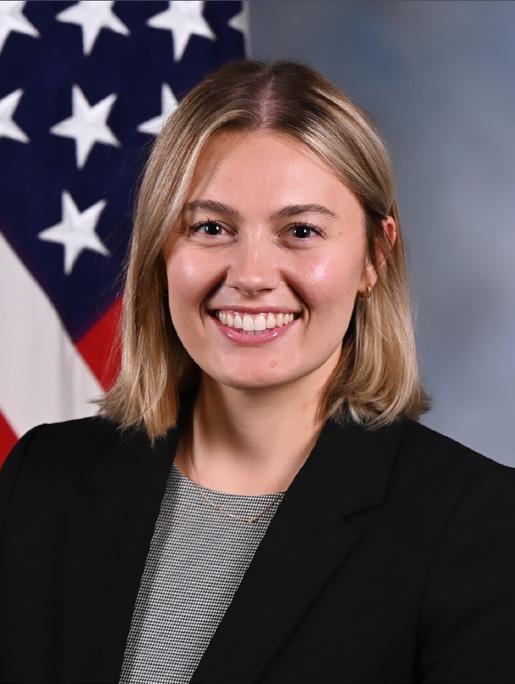
Bjelde, who grew up in Eden Prairie, Minnesota, attended Concordia following two years at a small college in Illinois, where she studied anthropology and French.
“I have a pretty long family legacy at Concordia, so I was missing out on being part of that and transferred,” she said.
Her anthropology coursework counted toward her new major at Concordia, sociology, and she took up business as a minor. She sang with the Chapel Choir, making many good friends and participating in the Concordia Christmas Concerts she had seen every year since she was a child. She joined the Family Weekend Committee and served as an Orientation Leader her senior year.
As a member of Concordia’s student government, Bjelde learned the ins and outs of dealing with bureaucracy, working effectively within an existing system to accomplish organizational objectives — knowledge that would prove crucial in her current position as strategic advisor to the assistant secretary of defense for cyber policy.
“It helped me understand that the process can serve a purpose,” she said. “Practicing that approach and learning to flex that muscle … Things will take a very long time unless you put in the work to make that process work for you, and I think the Student Government Association provided an avenue to learn how to do that at a very approachable level.”
After grad school, Bjelde took a break, applying for positions in counterterrorism in the knowledge that government jobs often have lengthy hiring processes. Unexpectedly, a friend from high school reached out to Bjelde, suggesting she apply for a position as project coordinator for cybersecurity projects at the Belfer Center for Science and International Affairs at Harvard Kennedy School.
Bjelde applied and accepted the job.
“What a fantastic learning experience and really, just a master class for me,” she recalled. “I was surrounded by so many experts, but I also learned about the role of academic institutions in influencing policy and how to network and build a network of really interesting humans that I might want to talk to in the future.”
She spent a year in Boston, enjoying the position and the snowy winters, and then the National Geospatial Intelligence Agency called her about one of those positions she’d applied for earlier. She accepted the position and stayed in it for nearly two years. Deciding she needed a broader portfolio, she took a job working for Thomson Reuters Special Services, supporting a number of different organizations throughout the government. Her broad portfolio there included working for the Defense Advanced Research Projects Agency, better known as DARPA, the organization that created the internet.
the expectations set forth by Congress in the National Defense Authorization Act.
The third part of her job involves working with the public, ensuring that when someone in her office agrees to speak at an event, all the legal and ethical requirements are met and all related content released to the public is checked.
“Technology is changing at a pace that doesn’t allow us to be stuck.”
“You don’t have to be a subject matter expert to work in the field,” Bjelde emphasized. “It’s really an enabling job that I play. I am not developing the policy. I am making sure that the humans who have that expertise can come together and solve hard problems in a room, and then I can take some of their tasks.”
She loves her work.
“That got me thinking about some of the things that I had started thinking about when I was working at Harvard,” Bjelde said. “And that just got me really interested in getting my foot back in the door in government and seeing if there were any possible opportunities to work in a cyber or cyber-adjacent role.”
While Bjelde had been diversifying and honing her skills, so had her colleagues, including her original supervisor at Harvard, who had become the principal cyber advisor to the secretary of the army. In subsequent assignments, their paths crossed again — when there was an opening on his team, she interviewed for the position and began working in the Pentagon.
Eighteen months into that role, she had the opportunity to serve as strategic advisor to the newly confirmed — and the Department of Defense’s first ever — assistant secretary of defense for cyber policy.
As strategic advisor, Bjelde serves as a trusted advisor to the assistant secretary on a range of programs. She manages the special projects portfolio, gathering the right experts together and producing work for the White House, the secretary of defense, or the deputy secretary of defense. In addition, Bjelde helps ensure that the DOD is making progress meeting
“There are so many challenges that we have yet to figure out how to solve, which makes it a really ripe environment for innovation, for creativity — for trying a different way of approaching the problem,” she said. “It’s not stuck in the status quo in the same way as other problems that we face because the technology is changing at a pace that doesn’t allow us to be stuck.”
In Fall 2024, Concordia introduced multiple options for students interested in a career in cybersecurity:
A computer science major with a concentration in cybersecurity
A business major with a concentration in cybersecurity
A cybersecurity administration minor
For more information, visit ConcordiaCollege.edu/Cybersecurity

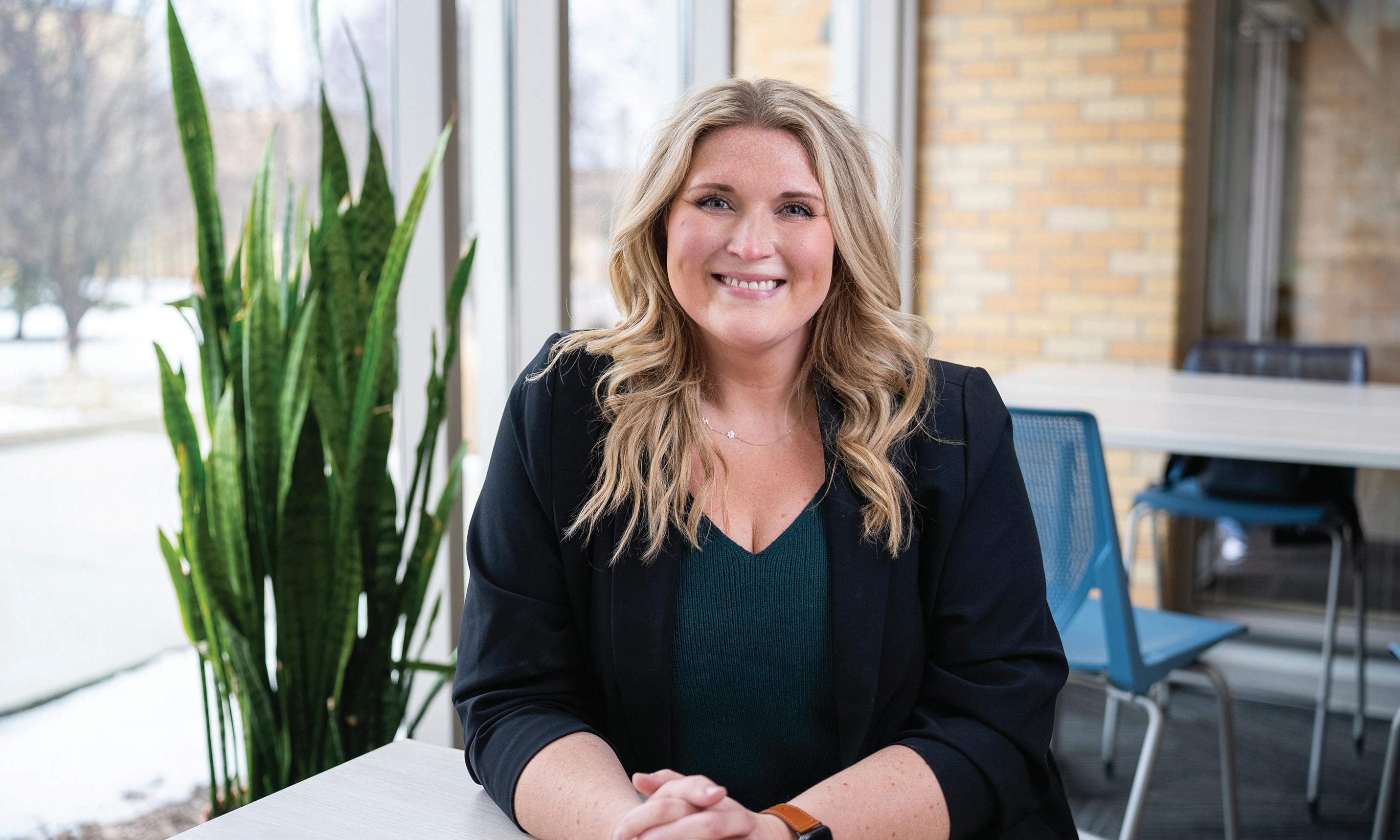
AN UNEXPECTED CAREER IN PUBLIC HEALTH ALLOWS COBBER TO ENGAGE WITH HER COMMUNITY FROM NORTH DAKOTA TO THE CDC
BY ALI FROSLIE ’18
When it’s observed that she has many roles, Katarina Domitrovich ’18 jokes, “I feel like I’m a cartoon character where the body is standing still and the arms are pulling in from all different directions.”
And it’s true — the list of roles Domitrovich has in both professional and volunteer capacities is impressive. Her current role is a community engagement specialist within North Dakota Health and Human Services’ public health division. This means she is charged with
improving communication between state and communities, including local public health units and organizations. She works with all 53 counties within the state and the 28 local public health units that serve within those communities.
She’s also the representative for the statewide Youth Advisory Board and she oversees the Ambassador Program among North Dakota college and university students.
“I absolutely love it,” she said. “I love being able to find connections and use things I’m passionate
about in my personal life and translate that to what I do professionally.”
However, a career in public health wasn’t always her goal. If asked what she’d be doing after graduating, Domitrovich would say she was set on a pre-physician’s assistant track. After spending her time at Concordia studying biology, chemistry, and classical studies, she was sure she wanted to be working with patients oneon-one. However, a series of postgraduation events led her down a different path that eventually changed her mind.
Recently, her drive led the way to a trip to Atlanta, Georgia, where North Dakota was invited to the Centers for Disease Control and Prevention as recognition for the excellent work they do with rural health. Domitrovich spoke on a panel with representatives from Nebraska, Utah, and North Dakota’s State Office of Rural Health.
“I’m really thankful for amazing professors that actually cared about us as human beings and not just as students.”
“Because I graduated in December, I used the next semester before walking in graduation to do research with a professor at MSUM in microbiology because I had taken a class with her the semester before,” Domitrovich said. “In our conversations, she’d ask me if I ever thought about going into public health and I’m, like, what is that?”
Domitrovich put the issue to rest and went to visit a friend in Uganda. However, her travels gave her the necessary reflection to decide that maybe a career in public health was the way to go after all.
“I realized I care about fixing the upstream issue — focusing on why something is happening and how we can prevent it. The systematic issues,” she said. “I really love that, and I loved how public health focuses on the community as a whole versus the one-on-one care that a medical provider would have.”
This realization led to Domitrovich pursuing a Master of Public Health from the University of North Dakota in fall of 2019. A graduate degree during the height of COVID-19 is an interesting route to take, but it also fueled Domitrovich’s passion to address the complications that came after 2020.
“I was originally hired to oversee a grant from the Centers for Disease Control and Prevention (CDC) to address COVID-19 disparities. And, with that, came close partnerships with those community members and questions like, ‘How can we be better prepared for this going forward? How can we address things that were put on hold during COVID-19 and take the opportunity to really build up our infrastructure?’” she said. “It was fantastic to be part of the COVID-19 emergency response and now to be part of closing out the cycle and damage of COVID-19.”
“There were certain states that were recognized or identified as excelling or just having an innovative approach to how they focused on rural health and addressing COVID-19 disparities,” she said. “It was a meeting where we were able to learn from each other and celebrate our successes.”
One of North Dakota’s successes includes increasing the number of cervical and breast cancer preventative screenings to more than pre-pandemic numbers through partnership with Women’s Way.
“I’d love to say that we’re highlighted for the good things all the time, we know in public health and in North Dakota that is not always true,” she said. “But having those conversations and being a voice talking about North Dakota and how successful our initiatives have been is great.”
Domitrovich says the meeting was a great time for people with similar interests and passion to come together and learn from each other, and she credits Concordia with giving her a love for lifelong learning.
“I’m really thankful for amazing professors that actually cared about us as human beings and not just as students,” she said.
Concordia recently added a public health minor, which Domitrovich is thrilled about. She encourages students to take a class, even if they’re not sure if they’ll end up in a public health career.
“What’s the harm?” she said. “If you’re in political science, if you’re in nursing or any healthcare profession, biology, chemistry — public health is in everything. It’s in water quality, restaurants and food, travel and lodging. It’s going to give you that bigger picture into the communities you’re going to be serving. It’ll give you the broader picture of everything that impacts someone’s health.”
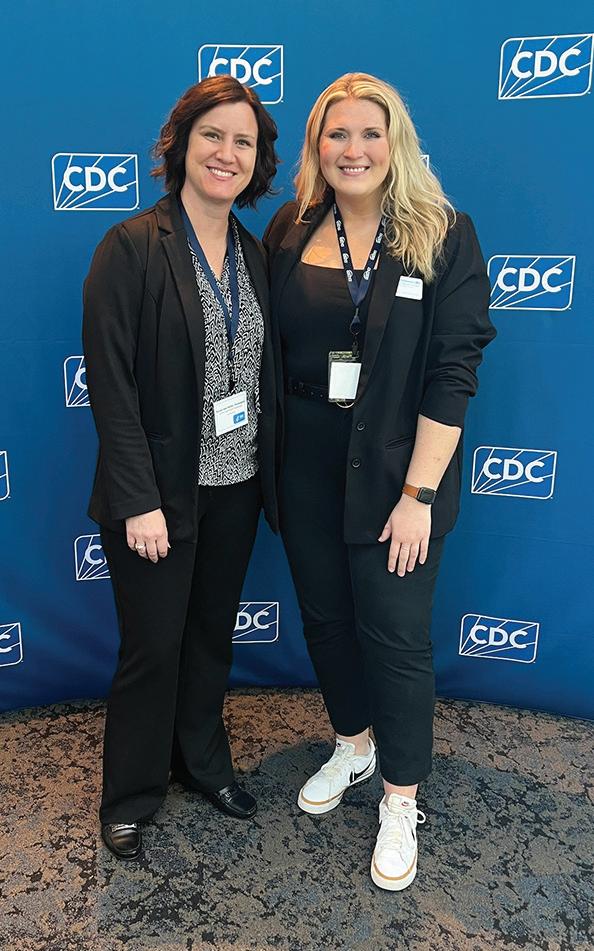
Nicole Threadgold, left, of the University of North Dakota’s Center for Rural Health and North Dakota’s State Office of Rural Health, and Katarina Domitrovich ’18, right, represent North Dakota at a Centers for Disease Control and Prevention meeting celebrating successes in October 2024 in Atlanta.


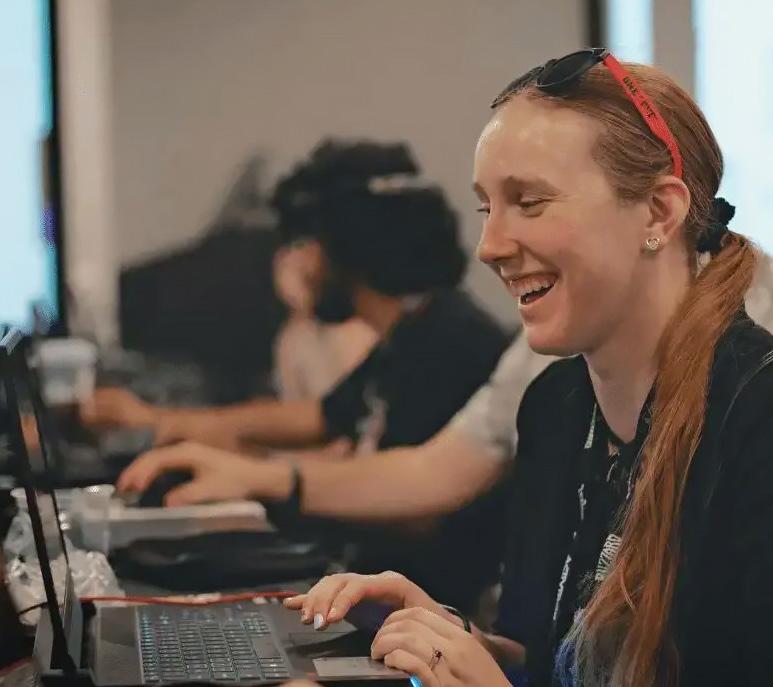

BY KARI LUCIN
Although both graduates of Concordia’s Class of 2016, Molly Lafferty and Zoey Schlemper’s journeys into the world of game development started from diverse backgrounds, carving out unique paths that led them to influential roles at two of the biggest names in the gaming industry. Lafferty and Schlemper are proof that the intersection of creativity, problem-solving, and persistence can transform passion into a career that shapes the digital experiences of millions worldwide.
A video game can have photorealistic water physics, stunning character models, and witty writing, but without a user interface — the menus, buttons, and on-screen information displays — that game would just be a movie.
Whether it’s as simple as a thermometerstyle health bar or as complex as layered, customizable equipment menus, a user interface is critical in helping a player understand what’s going on, allowing them to actually play the game.

Molly (Lee) Lafferty ’16, who majored in mathematics and physics, builds those user interfaces in her work as an associate user interface engineer with Infinity Ward, a developer of the blockbuster Call of Duty video game franchise.
Published by Activision, the franchise has been around for more than 20 years, with the last three games featuring Lafferty’s work, including her recreation of the calling card challenges menu in Call of Duty: Black Ops 6 and her addition of unlocking criteria to calling cards and emblems in Call of Duty: Modern Warfare III.
“I didn’t always know I’d be interested in a career in game development,” said Lafferty, whose hometown is Roseau, Minnesota. “My first job out of graduate school was more toward software
engineering. Then I found out about Activision’s Level Up U program and encouraged my thenfiancé, now husband, to attend the webinar for it and apply. Then we both got into the program.”
The groundwork for graduate school and Level Up U began at Concordia, where Lafferty took her first introduction to computer science class, as well as a course on databases. She was a member of the Math Club and the Society of Physics Students but also participated in the Symphonic Band and French Club.
“I actually made my first game at Concordia, a Java Connect 4 game, as a final project,” she said.
During graduate school, her now-husband drew her further into game development and the two co-founded the University of Nebraska-Lincoln’s Game Development Club, attending game jam competitions and creating games from scratch over a single weekend.
Now Lafferty resides in Los Angeles, as Infinity Ward is based in Woodland Hills, California.
“It’s a challenge to get the right job in the gaming industry, but just keep learning and put your best foot forward,” Lafferty advises prospective game developers, praising her team and her manager for their efforts and support. “Imposter syndrome is real. When I first joined the gaming industry, and sometimes even today, I may feel like I don’t belong because I don’t know enough, but I shouldn’t feel that way.
“I was hired because they want me here and that’s something I have to keep reminding myself. So don’t be afraid or intimidated when you’re starting out in the gaming industry,” she added. “If you’re hired, that’s because your company wants you there.”



No matter how many hairs appear in a virtual puppy’s fur, how light sparkles on an in-game puddle, or how crow’s feet crinkle around a protagonist’s eyes, a human artist had to put them into that video game.
Zoey Schlemper ’16 writes the tools and user interfaces that allow those artists to create in his work as a tools technical artist with Blizzard Entertainment.
The knowledge and experience he gained as an art major at Concordia helped him get into the highly competitive video game industry and led to his work on Overwatch 2, Halo Infinite, and Rogue Company.
“The best part is knowing that I’m helping to put smiles on the faces of children and adults across the world,” Schlemper said. “I also really enjoy working with all the passionate, kind, and super talented people.”
As a college student from Bemidji, Minnesota, he had many interests, serving as a resident assistant and building manager with Residence Life, singing with the Chapel Choir, working backstage and doing graphic design for theatre productions, and firing up the pizza oven for Dining Services. He even hosted Draft Punks, a drawing club.
“When I was young, fantasy and sci-fi inspired me to draw a lot,” Schlemper said. “I loved books, movies, games — all of that stuff. I drew fan art and posted loads of really bad anime characters on DeviantArt.”
During high school, he saw a behind-the-scenes video showing how one of his favorite video games was made. He thought it looked like fun and decided he had to be part of it.

Initially, he wanted to go into concept art but, after college, a newfound love of math and solving problems led him to develop more technical art skills, including Python scripting, 3D math, and industry-standard software like the Unreal Engine and Maya.
Schlemper earned his Master of Fine Arts degree at DigiPen and used the skills he acquired as a resident advisor to get a job as a leasing consultant while he worked to get into game development.
“I sold apartment leases by day while writing Python code and filling out job applications by night,” he recalled. “Finally, I got a chance to interview at 343 Industries, the studio behind Halo Infinite and, after showing them some of my art and code, I got the position!”
He advises people hoping to get into the industry not to get discouraged, as they may need to take other jobs while they hone their skills — in his case, coding, communicating, and using digital art applications.
“If you foster self-discipline and form a habit of learning the right things, your skills will speak for themselves,” he said. “Concordia may not have had a major that perfectly aligned to my rather strange career goals, but it obviously helped me achieve them. It also changed my life in so many positive ways. I met my amazing wife there — in fact, we were both clubbies during Orientation. We’ve been married seven years and, if I’m lucky, we’ll have many more together!”




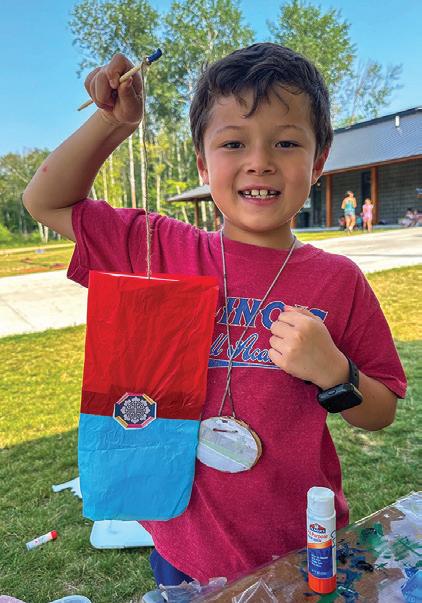
BY CANDACE HARMON
As Concordia Language Villages prepares to celebrate 65 years of immersive language and cultural education this summer, it does so with an even stronger connection to Concordia College.
The end of 2024 marked a pivotal moment in this partnership, aligning marketing, enrollment, and administrative efforts to maximize the Language Villages’ potential.
The departure of CLV’s executive director, Mary Maus Kosir, provided the opportunity for further integration when Dr. Susan Larson, Concordia’s provost and dean of the college, stepped in as interim executive director. A search for a permanent leader is underway.
“To me, being an interim leader means not only maintaining the organization’s mission of inspiring courageous global citizens but also advancing it,” Larson said.
To guide the Villages’ future, the Transform to Innovate Task Force has been established to evaluate and refine CLV’s strategic direction. This initiative aims to enhance resilience, innovation, and long-term sustainability while staying true to the mission shared by both CLV and Concordia College.

One shining example of this collaboration is the Master of Education in World Language Instruction program. Combining virtual coursework during the academic year with a 10-day, inperson intensive at the Villages in Bemidji, Minnesota, the program is designed to provide an immersive learning experience for educators.
The program is led by educators deeply connected to CLV. Dr. Cassandra (Oberembt) Glynn, program director and a 2001
Concordia graduate, first joined CLV as a villager at Waldsee, the German Village, and later worked at both Waldsee and Lac du Bois, the French Village. Dr. Brandon Locke followed a similar path, starting as a villager at Lac du Bois before serving in various leadership roles, including Village dean and dean of educator programs. Dr. Allison Spenader, another key faculty member, is a former dean of the Swedish Village.
For many students, this personal connection to CLV is a major draw.
Tresa (Reuter) Belgarde ’19 (M.Ed. ’23) pursued both her undergraduate and graduate degrees at Concordia because of her trust in Glynn and the program’s strong reputation. Similarly, Evelyn Eddy Galstad (M.Ed. ’24) found immediate value in the program, applying what she learned in real time as a counselor at Skogfjorden, the Norwegian Village.
“I was back in the village right after class, working with kids and language instruction,” Galstad said.
Marty Jost Fankhanel ’11, CLV’s associate director of programs, believes the Villages provide an unparalleled training ground for language educators.
“The hands-on, immersive experience at CLV keeps language learning alive and relevant, helping educators refine their skills in a dynamic environment,” he said.
More undergraduates are getting an early introduction to CLV. Since 2022, Concordia’s International Student Orientation has included a stay at the Villages, where students share meals, participate in team-building activities, and experience regional Minnesota culture.
For Gervasio Abarca Guerrero ’28, this experience included his first s’more and bonfire.
“It’s not just about the marshmallow — it’s about
the conversations you have around the fire.”
Kayitare Mwiza ’28 particularly enjoyed her first time singing karaoke. “The games helped us get to know each other and build bonds,” she said.
Alicia (Johnson) Kauffman ’02, Concordia’s director of global learning and international enrollment, emphasized the value of this orientation, noting that it provides a unique opportunity for students to build a sense of community as they begin their journey at Concordia.
The college’s world languages and cultures department has long benefited from its connection to CLV. The department holds its annual retreat at the Villages, and students have the opportunity to complete one of their required integrative learning (PEAK) courses through CLV.
Additionally, Concordia President Colin Irvine recently signed an agreement with Dakota State University, allowing Cobbers to take technology courses through DSU while DSU students can study critical and less commonly taught languages through the college and CLV.
Beyond campus, Concordia faculty members like Glynn and Dr. Gay Rawson, professor of French
From its humble beginnings as a single German Village, CLV has expanded to offer programming in 17 languages, serving thousands of learners each year. Here’s a look at what’s available:
Youth Immersion Camps: One-, two-, and four-week programs for ages 7-18, featuring full-language immersion, cultural activities, and classic summer camp experiences like campfires, swimming, and sports.
Adventure Day Camps: Designed for kids ages 6-11, these programs offer a taste of language immersion.
High School Credit Programs: Students can earn a semester or full year of language credit in two or four weeks, respectively.
Village Weekends: School-sponsored world language classes spend a weekend in CLV’s
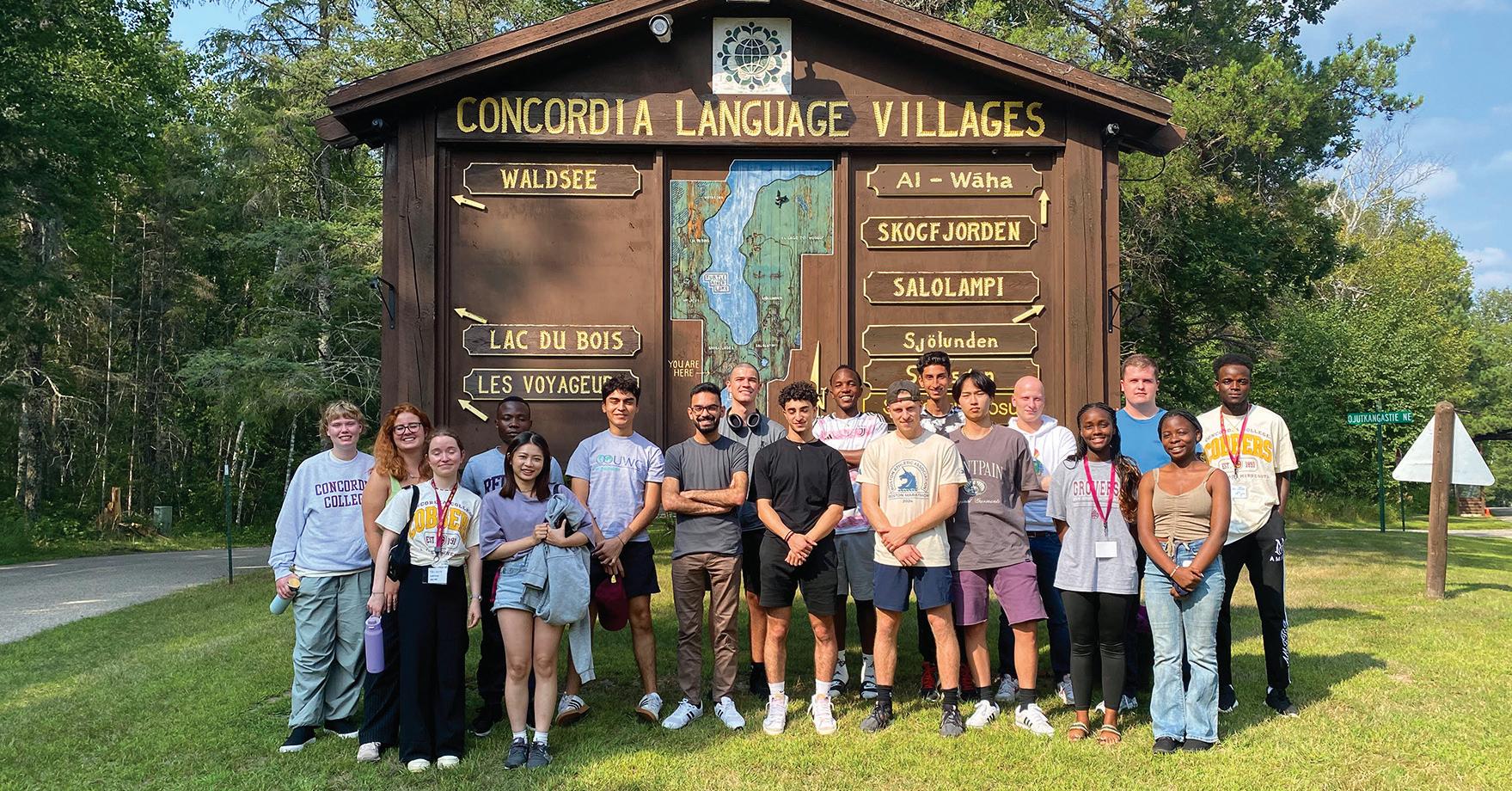

and chair of the world languages and cultures department, have been instrumental in leading training sessions for language instructors in the Department of Defense.
Rawson is also the program director of the Concordia Language Institute, which offers the public credit courses online to meet all skill levels.
As new ideas for collaboration continue to emerge, Concordia reaffirms its commitment to preparing students for a world that values multilingualism, cross-cultural understanding, and global engagement.
immersive environment, fostering enthusiasm for language learning.
Family and Adult Programs: Families can bond over shared language experiences during Family Weeks and Weekends, while adults can immerse themselves in language learning without the kids at Adult Weeks and Weekends.
Professional and Government Training: The Language Training Center provides specialized language and cultural instruction for corporate and government clients.
Online Learning: CLV offers six-week online courses, conversation hour groups, and specialized programs like travel prep or cooking classes in target languages.
Visit ConcordiaLanguageVillages.org to explore the possibilities.


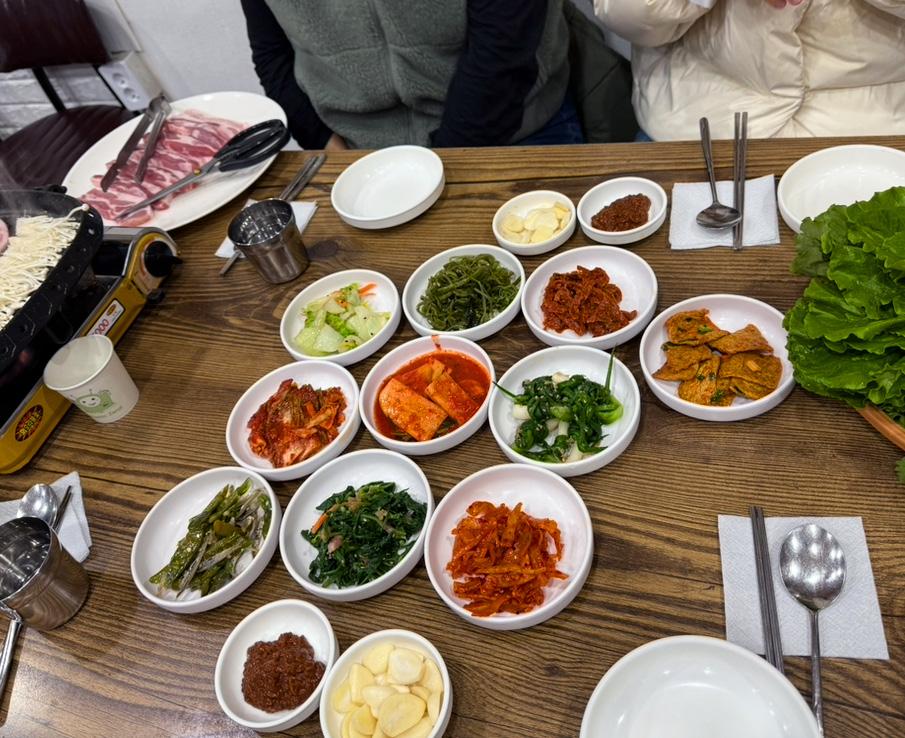



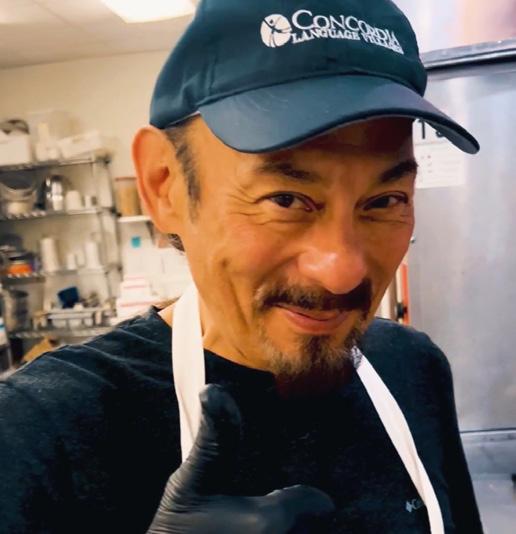
BY ADDIE GRAY
At Concordia Language Villages, food has always been more than just a meal — it’s a passport to language and culture and a key part of our immersive programming. Support for this commitment comes through the David Erceg Endowment for Food Service Staff Development, in recognition of David Erceg, the former site manager’s dedication to authentic cuisine at the Villages.
This endowment gave Lester 소명 So Myong Peterson, co-chef at the Korean Language Village, 숲 속의 호수 Sup sogŭi Hosu, the chance to take his first trip to Korea in November.
Reflecting on his journey, he said, “It felt like coming home.”
The trip was life-changing, strengthening his bond with his heritage and sparking a renewed passion to share Korea’s rich culinary traditions with others.
소명 So Myong’s involvement with Concordia Language Villages began in 2022 when he came across a job posting for a cook at the Korean Language Village.
His passion for Korean cuisine was deeply influenced by his late mother, a Korean immigrant, whom he cared for after his father’s passing for more than 20 years. During this time, his mother not only shared the art of traditional Korean cooking with him but also instilled in him a deep appreciation for the culture and love behind each dish.
“It was like my mom sent a pathway,” he explained about seeing the job posting.
Growing up in Bemidji, Minnesota, 소명 So Myong said he often felt out of place in a predominantly nonAsian community.

“Growing up … we weren’t Korean outside of the house, but we were so Korean in the house,” he recalled, “and that came through food.”


His mother used cooking as a way to pass down traditions and provide comfort.
“It’s like comfort food, the soups that she would make when we were sick or when we were upset,” he said. “She would make a special Korean food.” Dishes like miyeokguk (seaweed soup) for healing and kimchi-jjigae (kimchi stew) for comfort became symbols of her care and a tangible connection to their heritage.
During the summer, 소명 So Myong has been essential in bringing the authentic tastes and cultural traditions of Korea to life at the Korean Language Village.
The David Erceg Endowment provided the perfect opportunity for 소명 So Myong to explore the heart of Korean cuisine firsthand.
In November, 소명 So Myong traveled across Korea for three weeks, immersing himself in the country’s culinary culture. He trained with master chefs, worked in renowned restaurants, and even collaborated with actor and celebrity chef 어남선 Ryu Soo-young, who joined the grand opening of the Korean Language Village’s permanent site at Turtle River Lake in Bemidji this past summer. Among the highlights of his journey were mastering the art of royal court cooking, delving into the vibrant world of street food, and exploring the complexities of traditional dishes like banchan (side dishes).
But the impact of the trip went beyond technical skills — it was a profoundly emotional reconnection to his roots.
“I brought some of my mother’s ashes with me to Korea,” 소명 So Myong shared. “And when I was up in the mountains, by the big stream, I released her into the river. So, in a sense, I brought her home.”
Now back at the Korean Language Village, 소명 So Myong is eager to share what he’s learned. He plans to introduce new recipes, innovative cooking methods, and cultural stories to enrich the immersive experience for every villager who walks through the doors.
BY KARI LUCIN
Crowds cheered in Korean and English in July 2024 to celebrate the opening of 숲속의 호수 Sup sogŭi Hosu, the newly built Korean Language Village nestled on the banks of Turtle River Lake near Bemidji, Minnesota.
The two-phase building project was prompted by increasing public demand for opportunities to learn about Korean language and culture, which in turn resulted in waitlists for students eager to become villagers.
“Korean has become a powerhouse of global youth culture,” said Dr. Dafna Dahee Zur, dean of the Korean Language Village and associate professor of East Asian Languages and Cultures at Stanford University, citing the popularity of K-pop as well as Korean television shows in the U.S. “We’re also a very diverse program. The interest in Korean language is coming from all backgrounds, all ethnicities, and all parts of the United States.”

Kenny and Simone Park and the Simone Corp. provided a lead gift of $5 million to Concordia Language Villages to kick off the first phase of the project. Now complete, it includes two residences for villagers, as well as a dining center with a commercial kitchen, an administrative complex, a waterfront area, and a soccer field.
The second phase will include more residences, a cultural activities center, a sports activity center that includes a traditional Korean archery range, and a pavilion at the edge of the lake.
All the buildings, designed by Archigroup MA out of Seoul, Korea, draw elements of traditional and modern Korean architecture together, in harmony with their natural surroundings in the North Woods of Minnesota.
The authentic architecture, food, and activities help villagers feel truly immersed in the culture and enhance learning opportunities, but the true heart of Concordia Language Villages is the people.
For more information on Concordia Language Villages, visit ConcordiaLanguageVillages.org

With 596 first-year and transfer students, this group of students is the largest since 2018, representing a nearly 28% increase compared to last year. Concordia officials attribute the growth to the approximately two dozen new academic and extracurricular programs and the Concordia Promise, which offers free tuition to students whose household’s adjusted gross income is less than $90,000.
ConcordiaCollege.edu/NewPrograms | ConcordiaCollege.edu/Promise
As a part of Concordia’s commitment to preparing students to take on diverse challenges and bring about positive change in our world, the college offers several opportunities to advance your education and career.
Master of Education in Health and Physical Education
Master of Education in Teaching and Learning
Master of Education in World Language Instruction
Master of Music in Music Education
Master of Science in Management Science and Quantitative Methods
Master of Science in Nutrition
Master of Science in Social Work
Data-Driven Supply Chain Strategy
World Language
ACCELERATED PROGRAM
Accelerated Bachelor of Science in Nursing
For more information, visit ConcordiaCollege.edu/Graduate
ACCELERATED MASTER OF SCIENCE IN NUTRITION AND DIETETICS
Our new 4+1 accelerated program in nutrition and dietetics will launch you into your career so you start earning money and making a difference sooner. ConcordiaCollege.edu/AcceleratedNutrition NEW! PROGRAM
Refer a NEW Cobber! Know a high school student who would make a great Cobber? Let us know! Referred students will be eligible for a $500 grant annually ($2,000 over four years). ConcordiaCollege.edu/Refer
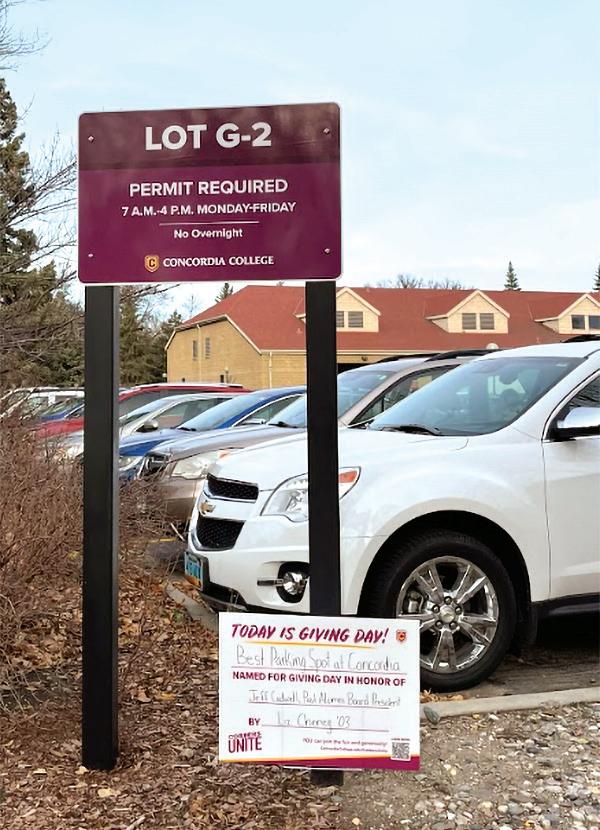
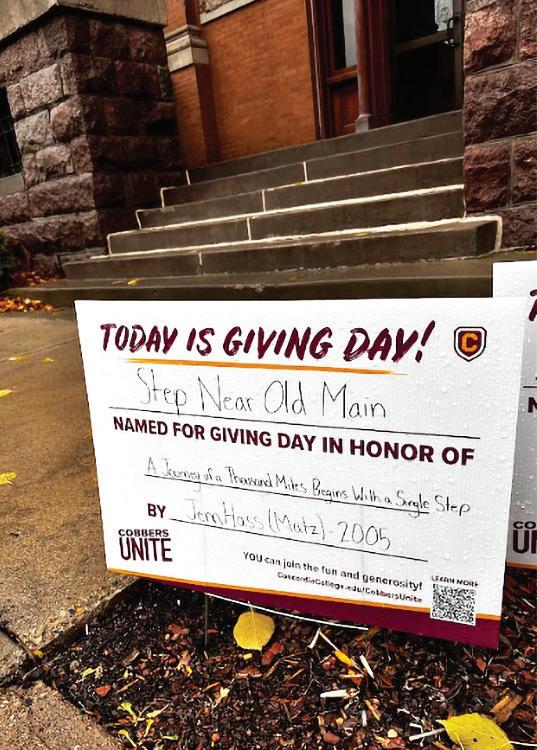


Concordia’s Giving Day was a record-breaking celebration of generosity with more than 1,300 people coming together to raise nearly $670,000 for student scholarships, ensuring a Concordia education is possible for every Cobber. New this year: Many donors named a memorable campus space in honor of someone who made their Concordia experience special. From a lane in the swimming pool to the steps of Old Main, a downspout, study desk, music stand, residence hall rooms, and more, the signs hanging all around campus were a fun and tangible reminder for students of the thousands of alumni, parents, faculty, staff, and friends who believe in them and their education. To see the photo gallery of signs, visit ConcordiaCollege.edu/SignsOfGenerosity.
Every day can be Giving Day! You can help fulfill our promise of making a Concordia education accessible at ConcordiaCollege.edu/Give. If you’d like to speak with a gift planner about your philanthropic goals, we’d love to connect. Learn more about investing in Concordia and the students we serve at ConcordiaCollege.edu/Giving.
Explore and connect with Cobber business owners through the Concordia College Cobber Business Directory located in the Cobbers Connect online community.
As your connection to a network of accomplished alumni across various industries, this resource will help you discover and support Cobber-owned businesses, find unique products and professional services, or simply to champion fellow Cobbers.
Cobber business owners and professional service providers can easily join the directory by clicking the plus icon next to the search bar within the platform, showcasing their startup or established venture.
Celebrate the successes of our alumni and strengthen the bonds within the Concordia community.
Visit alumni.cord.edu to find out more. CHECK IT OUT!

The Alumni Achievement Award, the college’s highest honor, is conferred upon alumni of 20 years or more who have distinguished themselves in their careers and service to others.

Retired Col. Jeffrey “Cap” Greenwood ’95 served a combined 28 years in the U.S. Air Force and the U.S. Space Force, establishing the first space detachment at the U.S. Air Force Academy and serving as its initial space commander. He was a master space officer with three command tours, serving in a variety of operational and staff positions, tours on the Air Staff and Joint Staff, was an instructor at Army War College, and is a two-time combat veteran of Operation Enduring Freedom (Afghanistan).
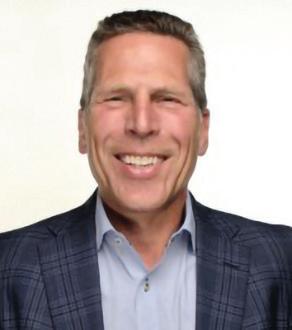
Eric Jackson ’88 is a board director and strategic advisor for Lube-Tech. Previously, he served as its CEO and president for 18 years, overseeing significant growth through both acquisition and expansion. His business experience includes roles with ConAgra Foods and Ernst & Young, as well as owning and operating a grocery store. He is a founding member of Next Level Partners, a network of philanthropists, sparked the launch of Leadership Roundtable – Twin Cities, and served as a founding partner of Social Venture Partners Minnesota.

Dr. Arthur Molvik ’64 retired from his position as a physicist at the Lawrence Livermore National Laboratory in California in 2007, following 35 years of contributions to physics and technology — including progress toward controlled thermonuclear fusion. After retiring, he continued working as a lab associate. His publications include collaborations with scientists at CERN, the Budker Institute of Nuclear Physics, and the GSI Helmholtz Centre for Heavy Ion Research. He is a fellow of the American Physical Society and a referee for multiple physics journals.

Dr. Margaret Semrud-Clikeman ’72, professor emerita of pediatrics and retired division director of pediatric behavioral neuroscience at the University of Minnesota Twin Cities, has performed critical research on attention-deficit/hyperactivity disorder, autism, learning and developmental disabilities, and educational neuroscience. She has published more than 60 articles, 75 chapters, and six textbooks and given more than 200 presentations at national and international conferences. She served in various editorial posts for multiple academic journals.


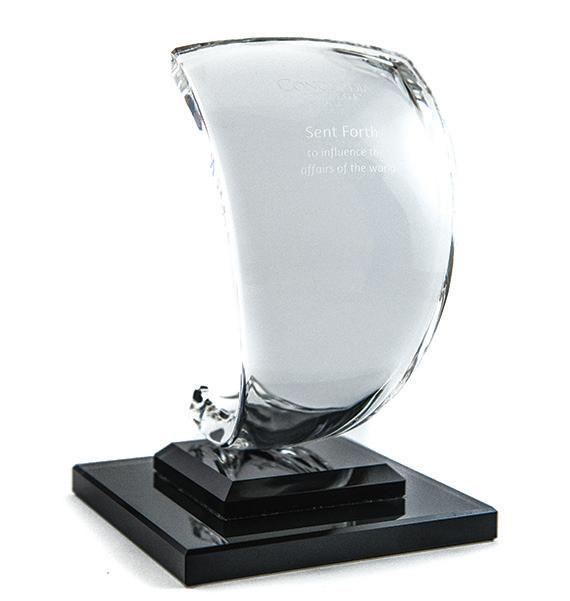
The Sent Forth Award is conferred upon alumni of less than 20 years who have distinguished themselves early in their careers and in service to others.


Erin Campbell ’04 was named commissioner of Minnesota Management and Budget in August 2023 and has since been leading the state agency. She served on Gov. Mark Dayton’s transition team and has taken on numerous leadership roles throughout her time as a public servant, earning numerous honors. She has also served as a board member at Avenues for Homeless Youth and served on the District Energy Board of Directors.
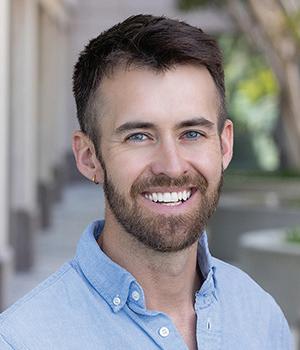

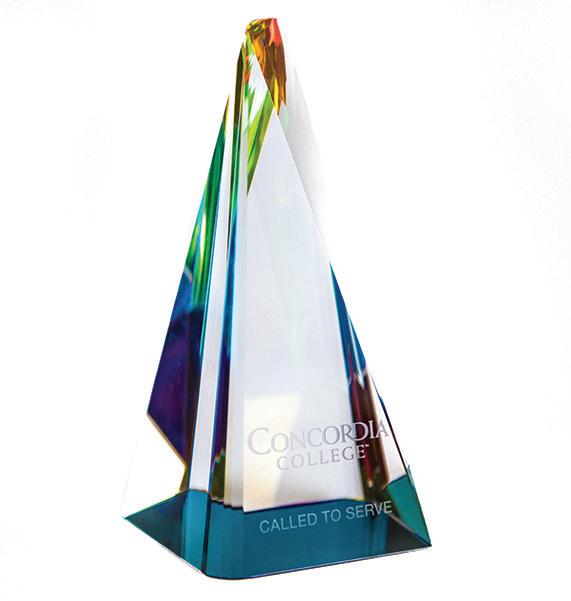
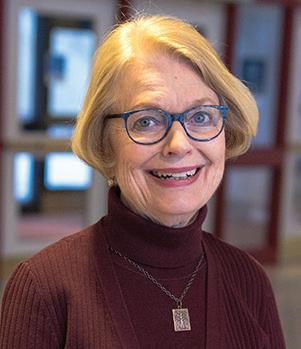
The Called to Serve Award is conferred upon alumni of any year who have demonstrated notable commitment to the mission of the college through lifelong service to their faith communities, education, arts, or other notfor-profit activities.

Dr. Alex Ritter ’09 is a senior scientist in cell and tissue reprogramming with Altos Labs in Redwood City, California, where he applies quantitative imaging approaches to visualize and measure certain effects on biological systems, with a focus on live imaging of immune cells killing cancer cells. He is deeply engaged in science outreach, contributing to Concordia academics throughout his career through delivering numerous lectures and serving on advisory boards. Ritter remains active in the arts, creating sculpted-glass models of cell biology.
Kathryn (Johnson) Benson ’64 retired in 2018 after 50 years of service to Concordia College. Benson started at Concordia as a hall director before becoming a staff nurse in the campus health center and then health center administrator, where she served for 40 years. Her commitment to service reaches beyond the college, where she has served on the YWCA Cass Clay Board of Directors and on the YWCA National Board, and has been an active member of Trinity Lutheran church. Benson has been recognized for her commitment, earning the YWCA Woman of the Year in Health, Concordia’s Ole and Lucy Flaat Distinguished Service Award, and the Soli Deo Gloria Award.
Carlton Urdahl ’63 is a retired educator who taught for 60 years. Throughout his extensive career, he taught math at two schools — Granite Falls for 10 years and Buffalo-Hanover-Montrose Schools for 50, earning the Teacher of Excellence Award at Buffalo High School. Urdahl’s passion for service reaches beyond the classroom, where he has been on numerous mission trips, delivered food for Meals on Wheels, and always finds a choir to sing with.

BY KARI LUCIN


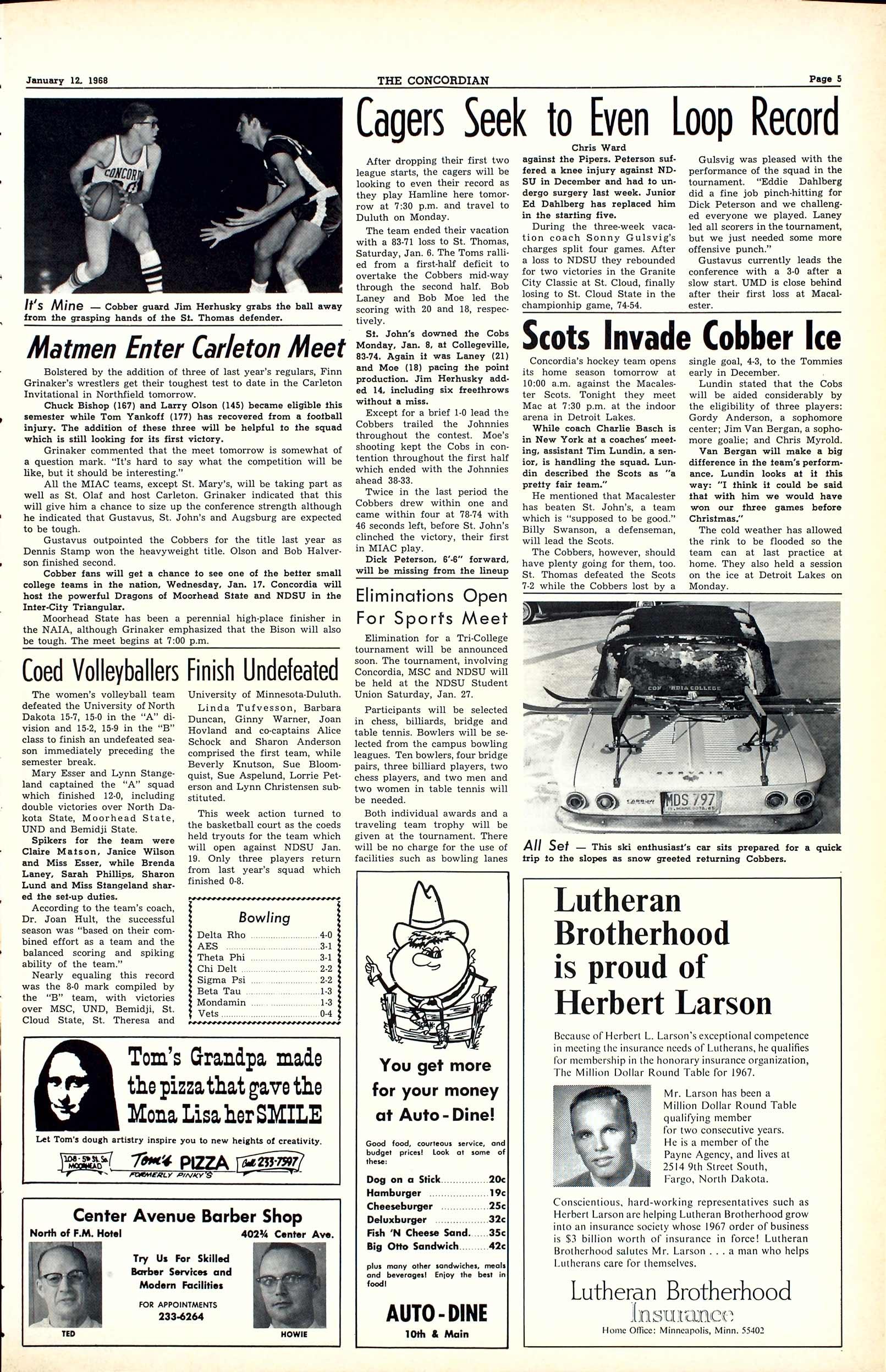
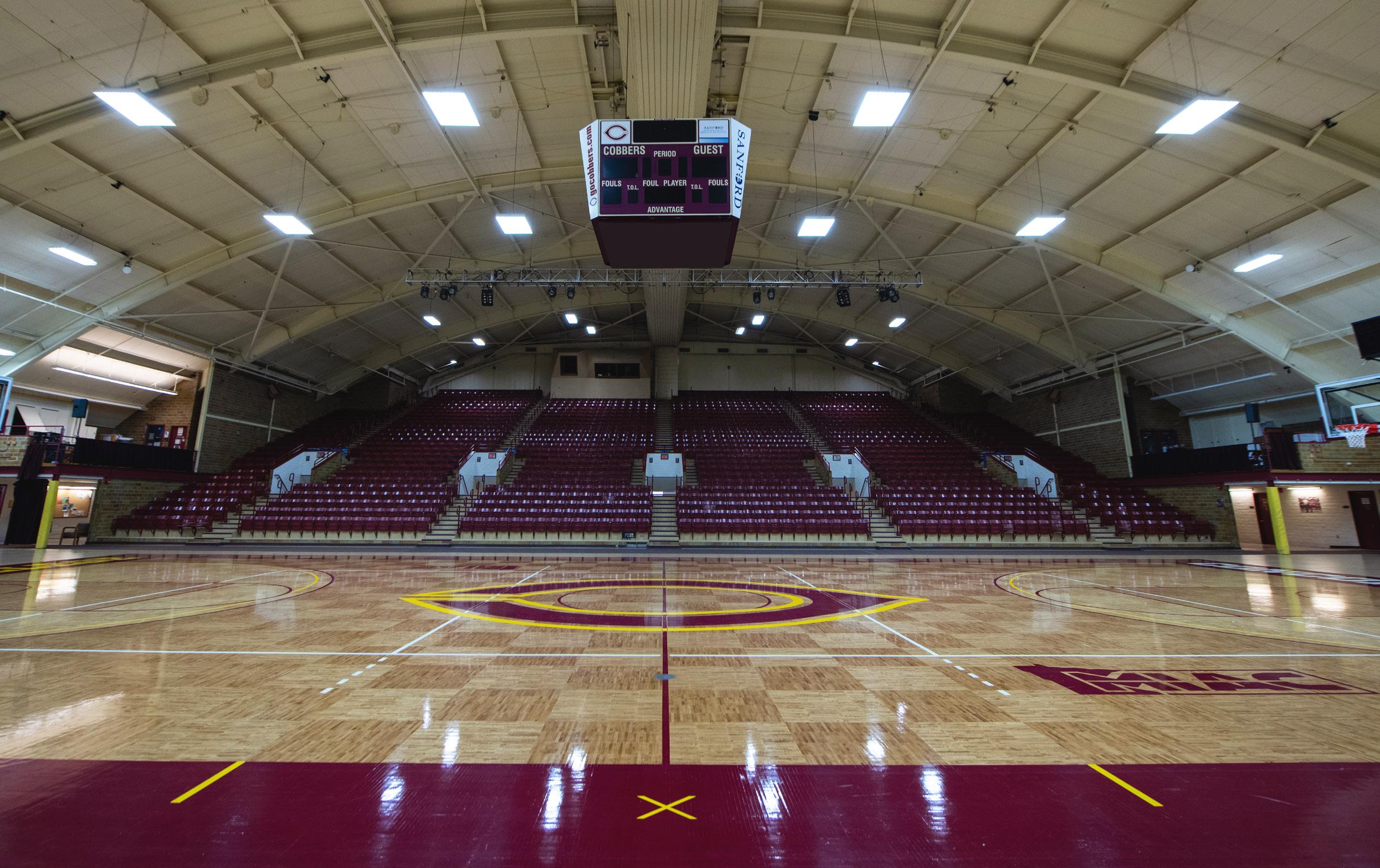
years, when you do connect, it’s like time hasn’t passed and you’re right back to the guy you remember way back in the ’60s.”
At the time, Herhusky was a two-sport athlete, as he was also on the baseball team. Similarly, his basketball coach, Sonny Gulsvig ’50, also coached the football team’s offensive line, so his family, including his wife Marcella and their children, became Cobber family too. The family legacy has continued with Sonny and Marcella’s granddaughter, Rachel (Burgau) Bergeson ’05, Concordia’s athletic director.
Bob Laney ’68 was starting his fourth season as a Cobber back in 1967, playing center and leading the scoring chart. These days, he’s retired and spends his time fishing, golfing, and enjoying life.
Jim Peterson ’67, who assisted Coach Gulsvig in the 1967-68 season, had captained the squad the year before and, decades later, remembers Laney for his talent.
“He had the best hook shot I’ve ever seen,” Peterson said.
Laney interjected: “That was Sonny Gulsvig.”
Coach Gulsvig walked up to him before practice one day and told him to try a hook shot. He was to practice every night for 15 or 20 minutes, alternating hands.
“I can remember the first game I tried it,” Laney said. “I think I missed two or three in a row, and I was ready to give up.”
Gulsvig didn’t let him.
“He came back and said, ‘You’re not done yet. Go out and keep shooting. It’ll start dropping.’ And he was right,” he said.
“At our 50th reunion, Bob (Moe) and I had the pleasure of going out on the new court and throwing up a few shots, and he can still hit it from the corner,” Herhusky said. “Those would be 3-pointers now, so he might be chasing Bob (Laney’s) total — but no one’s going to catch that for a long time.”
The rules have shifted, but basketball is still basketball, and Cobbers are still Cobbers. When the team went to Las Vegas for a tournament, Tyler Bormann ’06, current head coach of the Cobber men’s basketball team, invited Herhusky to a practice.
“I had a chance to talk to them,” Herhusky said. “And they couldn’t believe that we didn’t have a 3-point, or we couldn’t dunk, because every one of them could dunk, my gosh!”
The current players, he added, are bigger, faster, stronger, and better athletes, though they shoot about the same percentage as the ’67-68 team did.
“I enjoyed their team spirit, their cohesiveness, and how they pull for each other,” Herhusky said.
The 1967-68 team still pulls for each other too.
“Anything that happened to any one of us was because of all of us playing together as a team. No accolades for anybody, except from everybody playing as a team,” Laney said. “We all know that.”
“Anything that happened to any one of us was because of all of us playing together as a team.”
— Bob Laney ’68
Laney still tops the scoring chart for Cobber men’s basketball with 1,847 points — an impressive feat given that when he played there were no 3-point shots.
Herhusky’s on that list too with 881 points.
So is Bob Moe ’68, who played forward for the 1967-68 team and racked up a total of 898 points.
Bergeson praised Bormann’s efforts, which have reinvigorated men’s basketball at Concordia.
“I know my grandpa would be so proud of the work that Tyler has done in this program,” Bergeson said. “I am so confident in the work that Tyler does, and I believe in what he and his coaching staff are doing for our program.”
Bormann thanked Bergeson and the alumni for their support, which has included emails, conversations, and plenty of encouragement.
“It’s meant a lot to me, because the history of this program means a lot to me,” Bormann said. “This program was here long before I got here, and it’s going to be here long after I’m gone. I truly feel like we’re stewards of this.”

Sonny Gulsvig ’50 coached basketball and football at Concordia College for 37 years, as well as served several years as its sports information director and baseball coach.

BY ALI FROSLIE ’18
In Fall 2017, the Rev. Dr. Roy Hammerling welcomed a group of students into his First-Year Inquiry Seminar class on religion and C.S. Lewis. Now, seven years later, the group — including Hammerling — still meets regularly for “book club” where they primarily discuss fantasy and sci-fi novels.
When speaking about their book club, the alumni members like to poke fun at themselves.
“I could see somebody reading this and going, ‘These nerds miss religion class so much that they create homework for themselves in their adult life?’” Ingrid Jacobson ’20 said.
The book club, fondly named the CSL Club (for C.S. Lewis Club), consists of eight Cobber alumni
and their former professor, Hammerling. In the stories, many legendary groups gather entirely by chance, and this group is no different. For various reasons, all eight students separately registered for Hammerling’s inquiry course, C.S. Lewis: Religion in Fantasy.
So, what was initially just a curriculum requirement turned into years of meaningful connections. The group ended up loving their inquiry class so much that they didn’t want it to end. After seven years, the CSL Club has no intention of stopping their gatherings.
It was, as Hammerling puts it, “a teacher’s dream.”
“It was what every teacher dreams of — students who want to keep learning beyond the rigors of
essays and exams,” he said. “So, we met regularly to read more Lewis and other similar authors.”
While still in college, the group met in their old classroom to discuss short stories and films while scheduling around their other coursework. The club provided many of them motivation to continue reading and engaging in the humanities.
“It was what every teacher dreams of — students who want to keep learning beyond the rigors of essays and exams.”
— Rev. Dr. Roy Hammerling
“Most of us were science majors,” said Riley (Erlandson) Santelman ’21. “We really loved reading and analyzing the material, and we didn’t get to do that in our course load as much. That was always really fun.”
Even a pandemic couldn’t dampen their strides. As the group began graduating, they were already accustomed to meeting via Zoom. That, at least, was an easy transition.
“Just because we’re graduating didn’t mean it had to end, right?” she said. “It’s such a special thing for us to do. Having those connections as adults can be really difficult. I’m so grateful for this group of people. They were all at my wedding. Several were bridesmaids, and roommates, and just best friends throughout the years.”
Not to mention, as Hammerling is quick to note, the group is very professionally successful.
“This group has gone on to graduate school in the fields of theology, philosophy, neuroscience, epidemiology and food bioterrorism, music/opera, law, and still other areas,” he said. “They are seeking advanced degrees at Yale, University of Colorado, University of Florida, University of Minnesota, University of Washington, University of St. Thomas, and more. They are remarkable in every way.”
Santelman compares their group to Lewis and Tolkien’s writing club, the Inklings — another group of incredible minds who discussed works of literature. Also like the Inklings, they don’t just read published works on the New York Times bestseller lists. They also read each other’s works, including a novel Hammerling tackled as a retirement project.
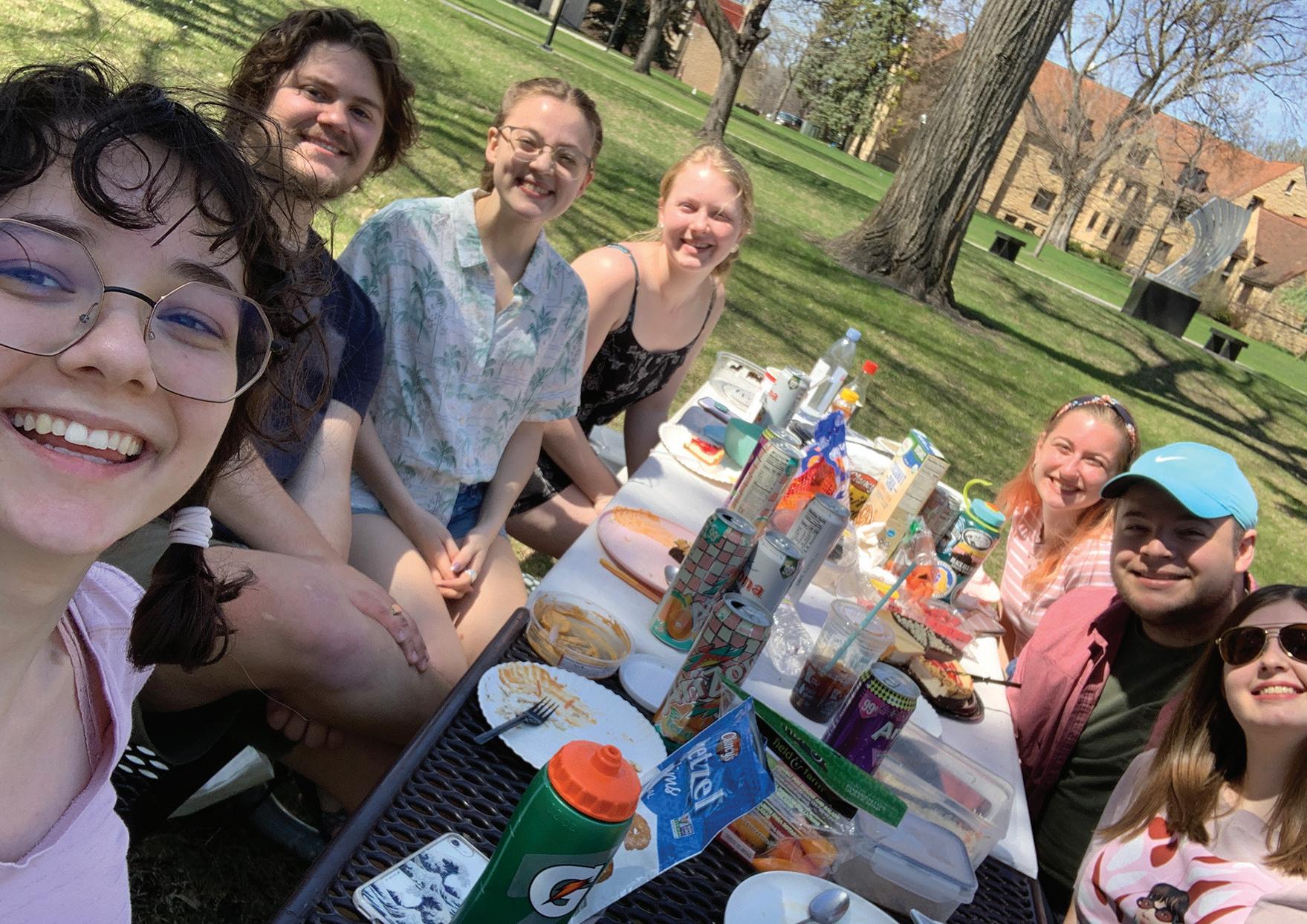
“It was so kind of him to give us that experience,” she said. “Since then, a lot of us have shared our personal writing, whether it’s fiction or nonfiction. That has been really special. It’s very vulnerable when I share a short story I’ve written and everybody’s talking about it for an hour.”
That’s the beauty of their community. It’s a sanctuary for each member to be fully open and honest about who they are and their “nerdiest” interests.
“I think we all feel really seen when we’re in that space,” Santelman said. “We truly can just be complete nerds.”
It’s not just the alumni who find deep meaning in the group. For Hammerling, emeritus professor of religion, the club was and is a beautiful constant as he transitioned into retirement.
“I wish all retiring professors the same blessing. This club is an oasis in the desert of having left behind the classroom,” he said. “I’m deeply grateful to these remarkable young people who give me hope that the world has people in it that will break the evil spells that always threaten to destroy our world. These students are like Bilbo and Frodo Baggins making the world safe for compassion or the Pevensie children of Narnia who, against all odds, see the world not as it is but as it should be, and they dream that reality into being.”
Ingrid Jacobson: “The Name of the Wind” by Patrick Rothfuss
Riley Santelman: “Piranesi” by Susanna Clarke
In true professorial ambiguity, Dr. Hammerling cannot pick. “This question is akin to ‘Who is your favorite child?’” he said.
901 8th St. S., Moorhead, MN 56562
Once a Cobber, always a Cobber! From generation to generation, the bond runs deep. Here’s to lifelong friendships, cherished memories, and a Homecoming that feels just like coming home.



Use #cordmn to share your posts and images with us.